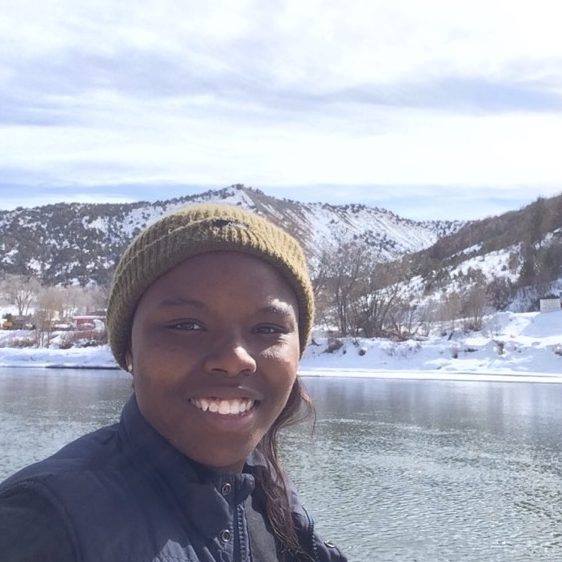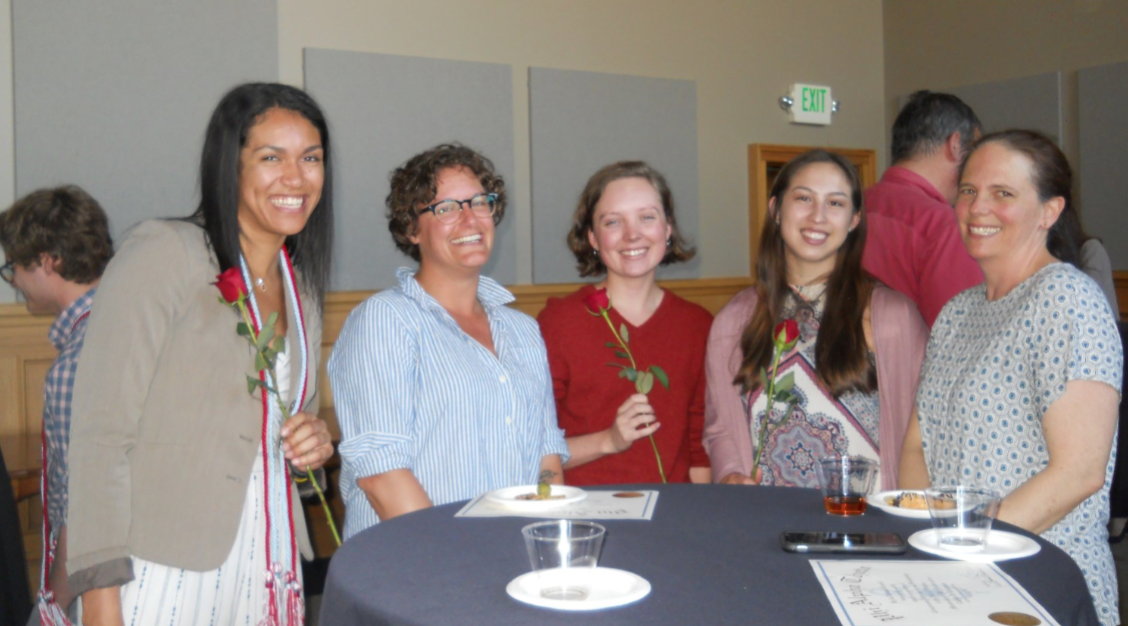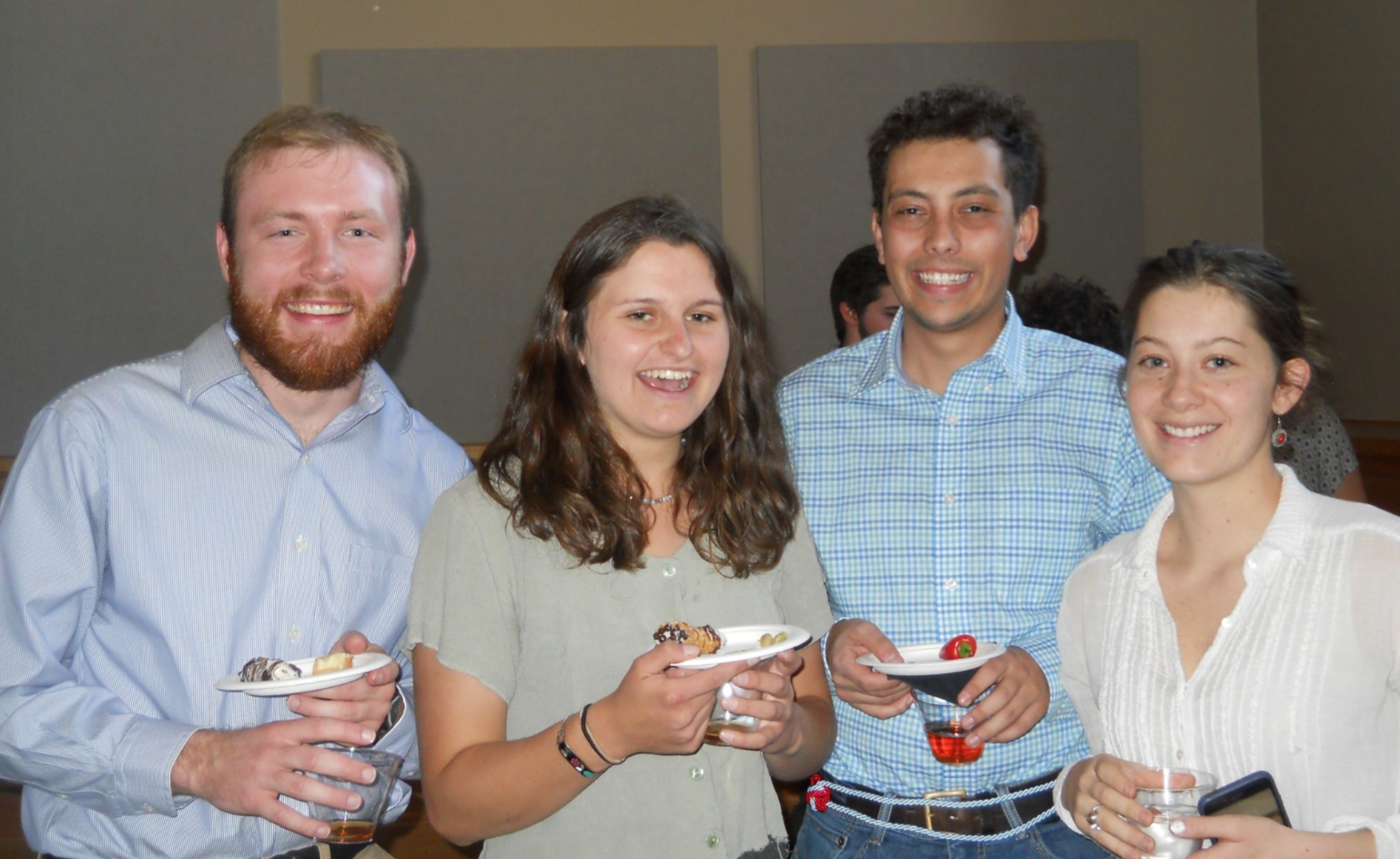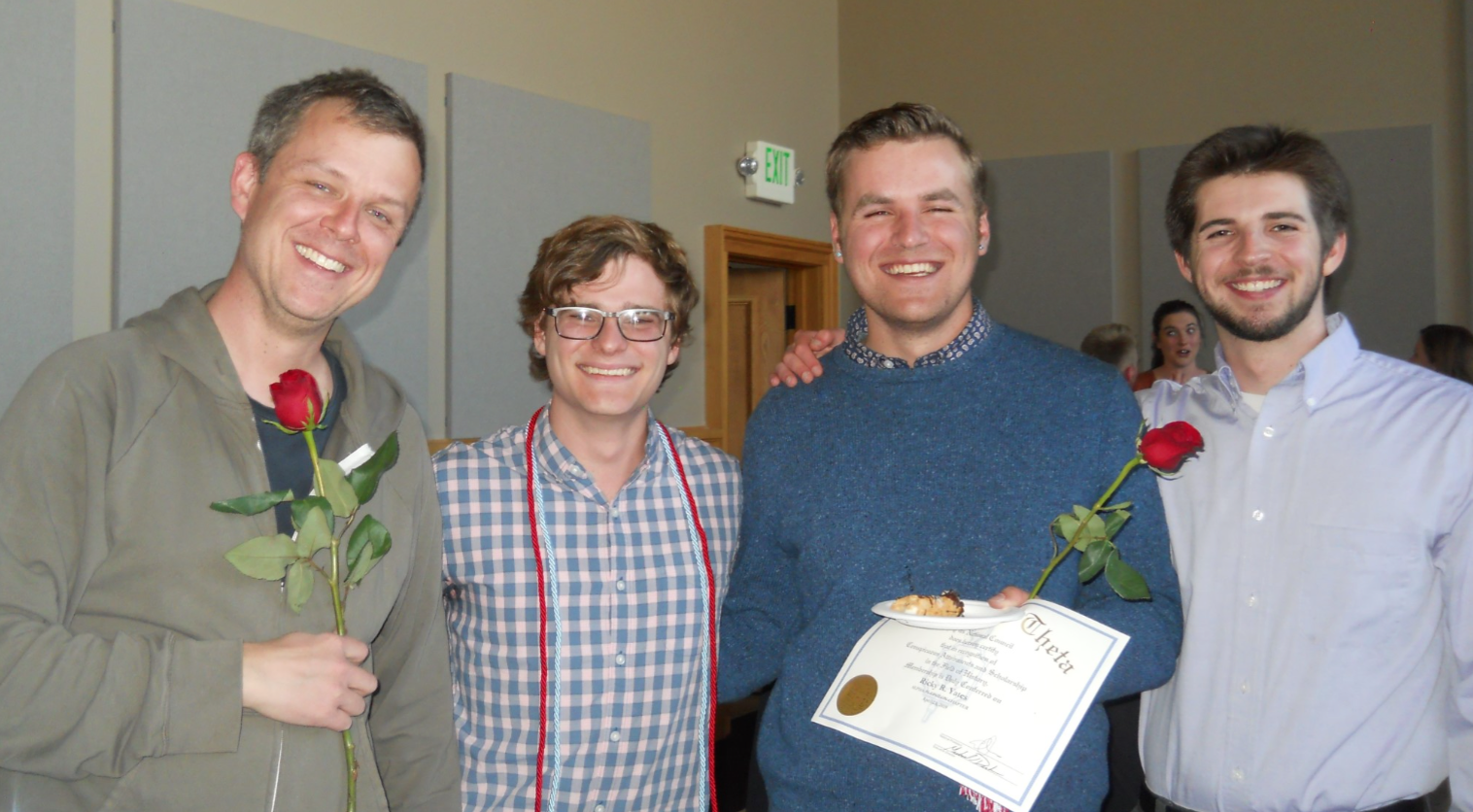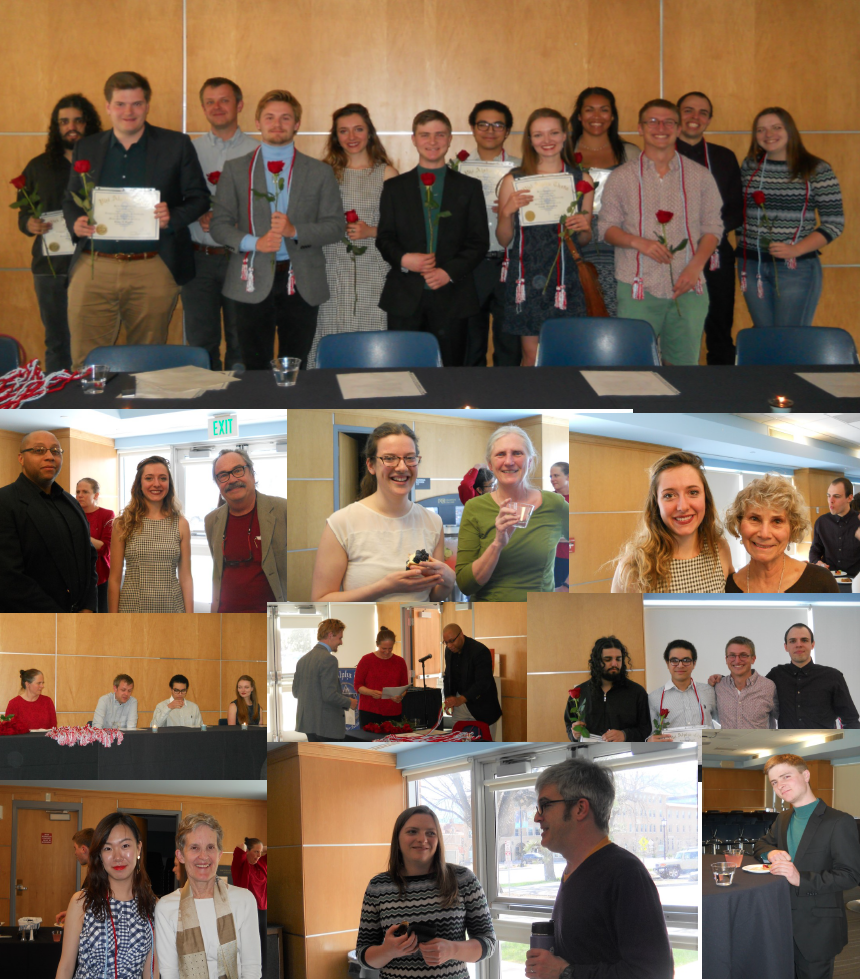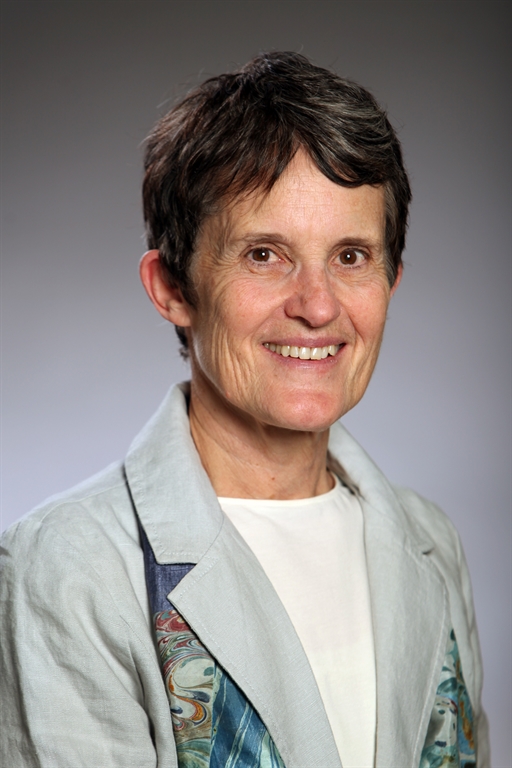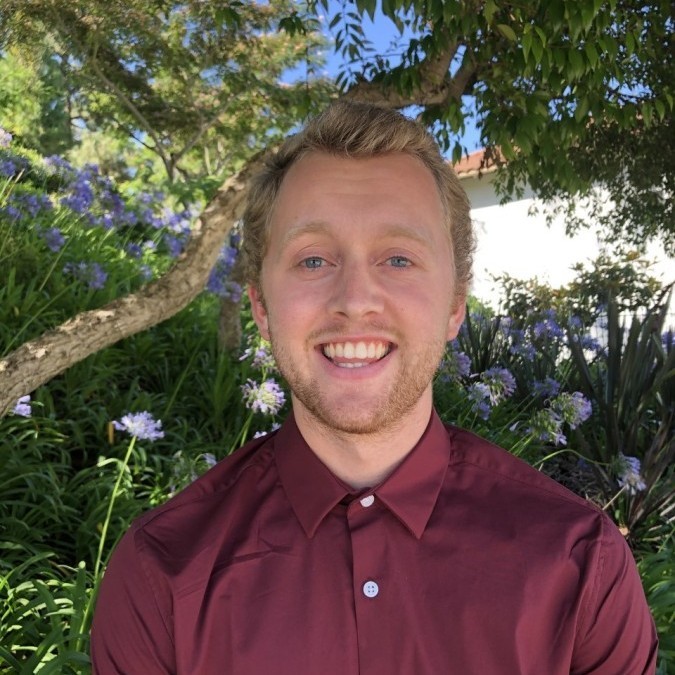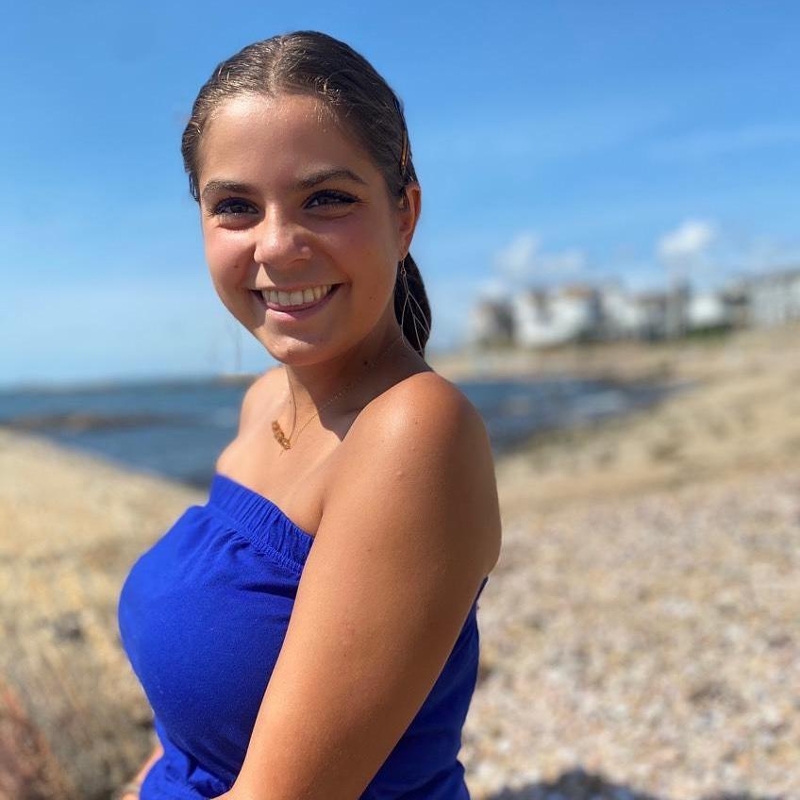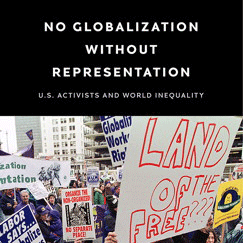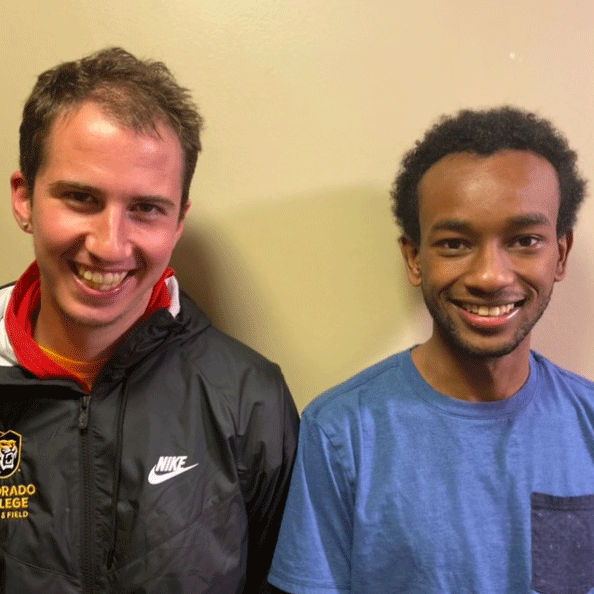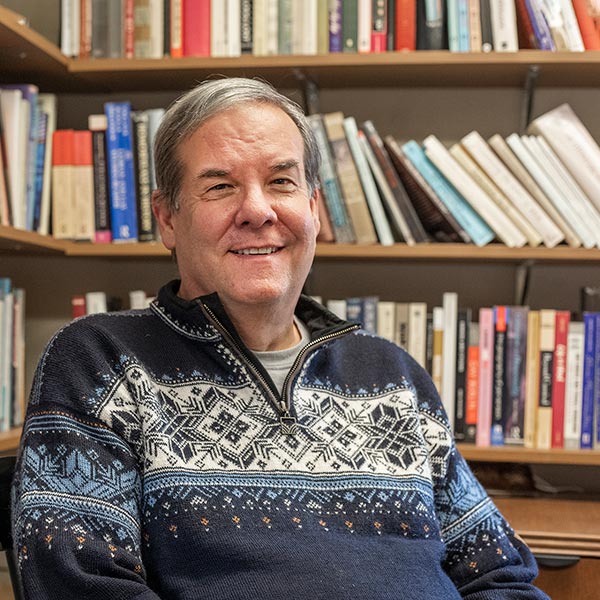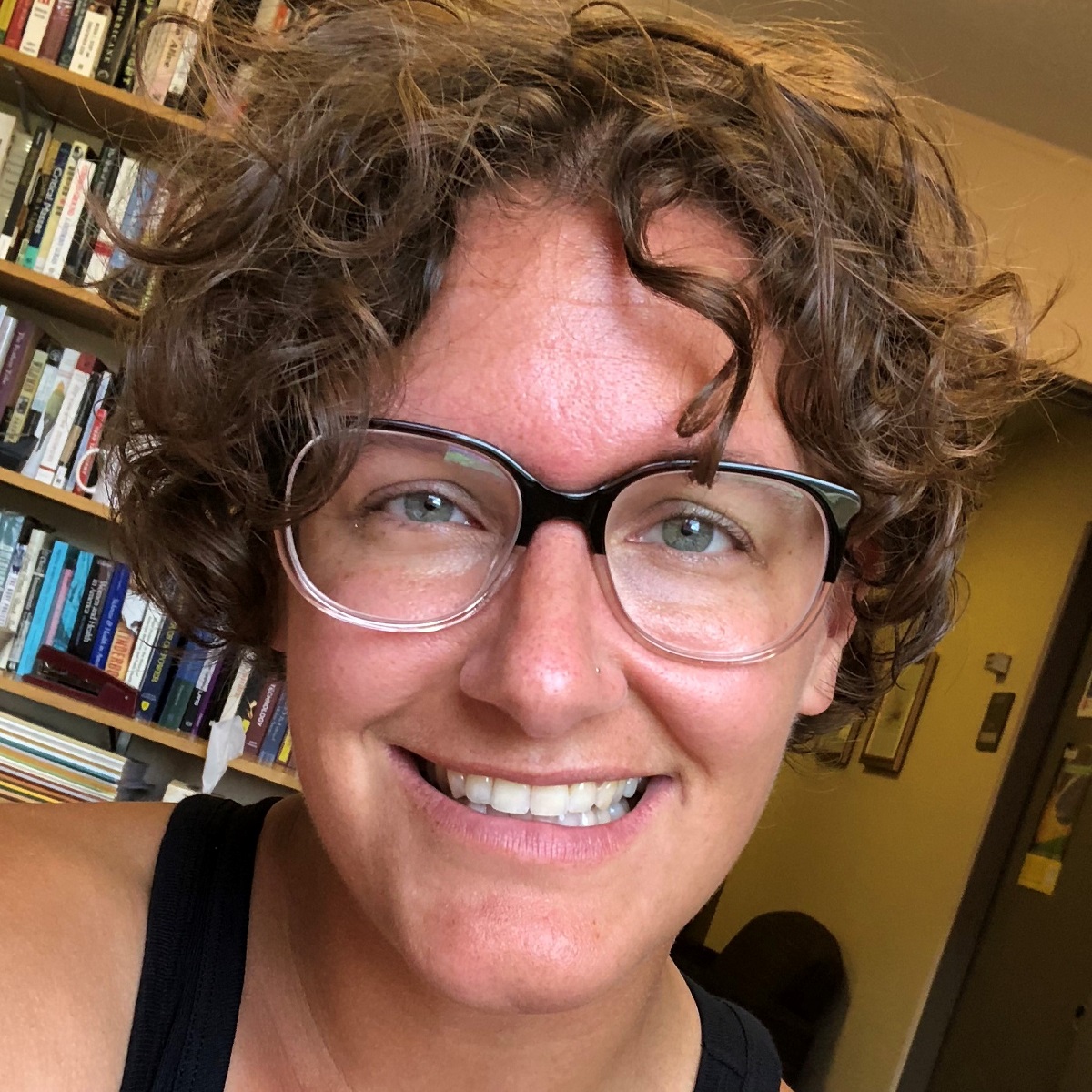Colorado College Professor of History Susan Ashley has published a new book, "'Misfits' in Fin-de-Siècle France and Italy." The book, published by Bloomsbury, focuses on conceptions of marginality in late 19th- and early 20th-century Europe.
As the 19th century drew to a close, France and Italy experienced an explosion of crime, vagrancy, insanity, neurosis, and sexual deviance. "'Misfits' in Fin-de-Siècle France and Italy" examines how the raft of self-appointed experts that subsequently emerged tried to explain this aberrant behavior and the many consequences this had.
Ashley considers why these different phenomena were understood to be interchangeable versions of the same inborn defects. The book looks at why specialists in newly-minted disciplines in medicine and the social sciences, such as criminology, neurology, and sexology, all claimed that biological flaws - some inherited and some arising from illness or trauma - made it impossible for these "misfits" to adapt to modern life.
Ashley then goes on to analyze the solutions these specialists proposed, often distinguishing between born deviants who belonged in asylums or prisons and "accidental misfits" who deserved solidarity and social support through changes to laws relating to issues such as poverty and unemployment.
The study draws on a comprehensive examination of contemporary texts and features the work of leading authorities such as Cesare Lombroso, Jean-Martin Charcot, and Théodule Ribot, as well as investigators less known now but influential at the time. The comparative aspect also interestingly shows that experts collaborated closely across national and disciplinary borders, employed similar methods and arrived at common conclusions.
You can find the book online here and in print here.
Milestones in History
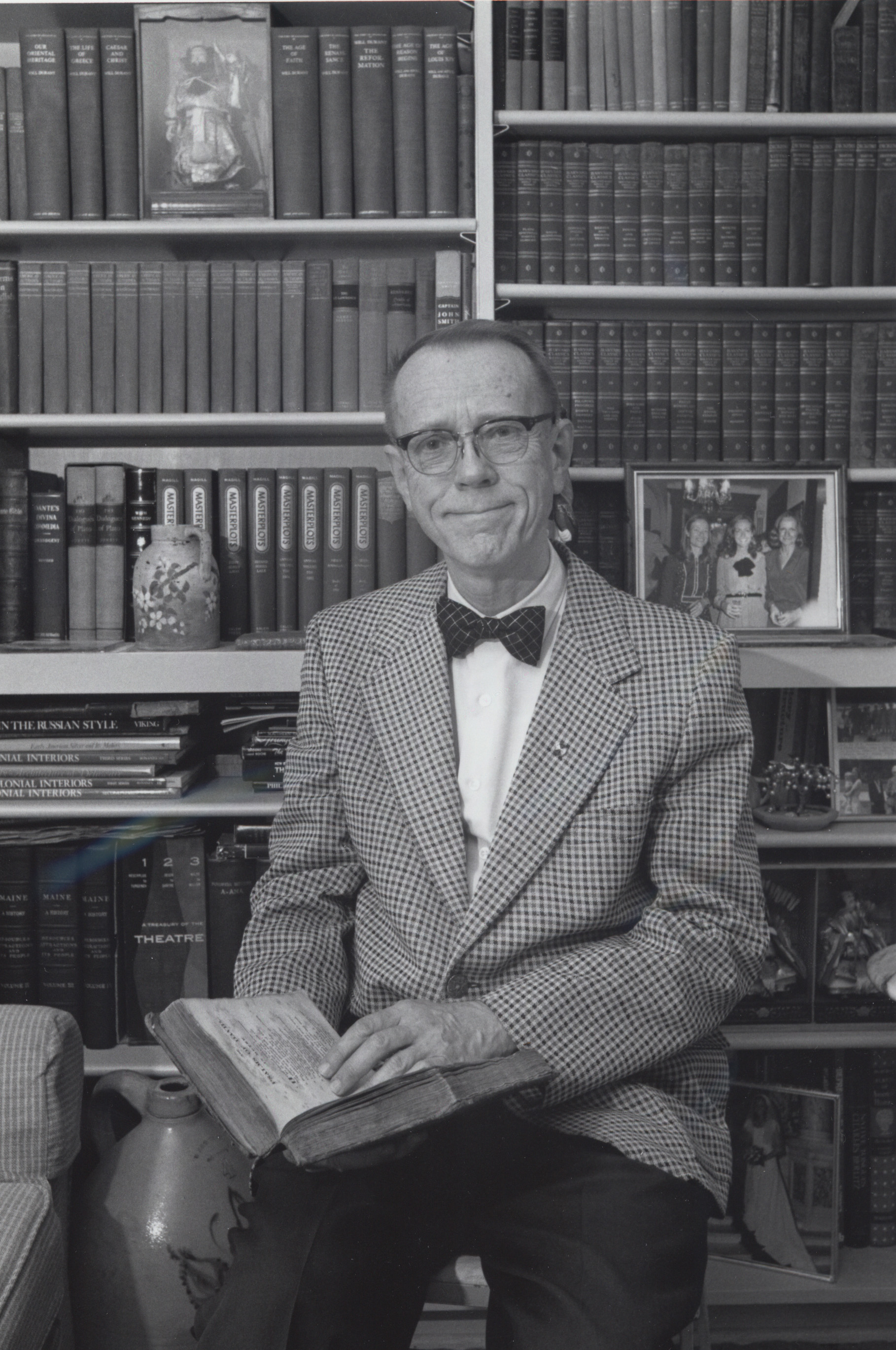 Our emeritus colleague Frank Hammond Tucker died on January 27, 2017. We in the History Department-and his students over many years at Colorado College-knew Frank not only as a scholar of Asian history but also as a polymath and outdoorsman. Frank was born December 29, 1923 in Millville, New Jersey. He studied as an undergraduate at Johns Hopkins University and its Peabody Conservatory, playing for a while with the Baltimore Symphony Orchestra and then completing his graduate study at Georgetown. He attended the Japanese Language School in Boulder, subsequently joining the Navy in 1943. Frank served for several years in Japan, then at the Naval intelligence school in Maryland. He was involved with the establishment of the Southeast Asian group in what later became National Security Agency. He belonged to a variety of historical societies and the Science Fiction Research Association, and was a leader in a variety of Colorado Springs benevolent societies.
Our emeritus colleague Frank Hammond Tucker died on January 27, 2017. We in the History Department-and his students over many years at Colorado College-knew Frank not only as a scholar of Asian history but also as a polymath and outdoorsman. Frank was born December 29, 1923 in Millville, New Jersey. He studied as an undergraduate at Johns Hopkins University and its Peabody Conservatory, playing for a while with the Baltimore Symphony Orchestra and then completing his graduate study at Georgetown. He attended the Japanese Language School in Boulder, subsequently joining the Navy in 1943. Frank served for several years in Japan, then at the Naval intelligence school in Maryland. He was involved with the establishment of the Southeast Asian group in what later became National Security Agency. He belonged to a variety of historical societies and the Science Fiction Research Association, and was a leader in a variety of Colorado Springs benevolent societies.
Frank was a member of the History Department from 1963 to his retirement in 1989. In that period he authored three books: The White Conscience (1969), The Frontier Spirit and Progress (1980), and Knights of the Mountain Trails: A Century of Hiking in the Mountains and Parks of the Pikes Peak Region (2003). The first two of these studies bespoke his broad learning and skillful framing of large historical questions. The last was close to home and heart-an account of the elite culture of late nineteenth and twentieth century Colorado Springs as seen through the hiking club with which Frank adventured for decades, the Saturday Knights. Frank continued up until the last year of his life to be an active participant in our monthly departmental seminar. We will miss his deep intelligence, his profoundly gentlemanly manner, and the quick flash of his wit, but we are grateful to have been fellow-travellers along his long and richly varied career. Five boxes of his papers are preserved in Tutt Library's Special Collections. Frank would smile to acknowledge this trove a lively resource for some future researcher into twentieth century scholarship, the love of nature, and service to nation and community.

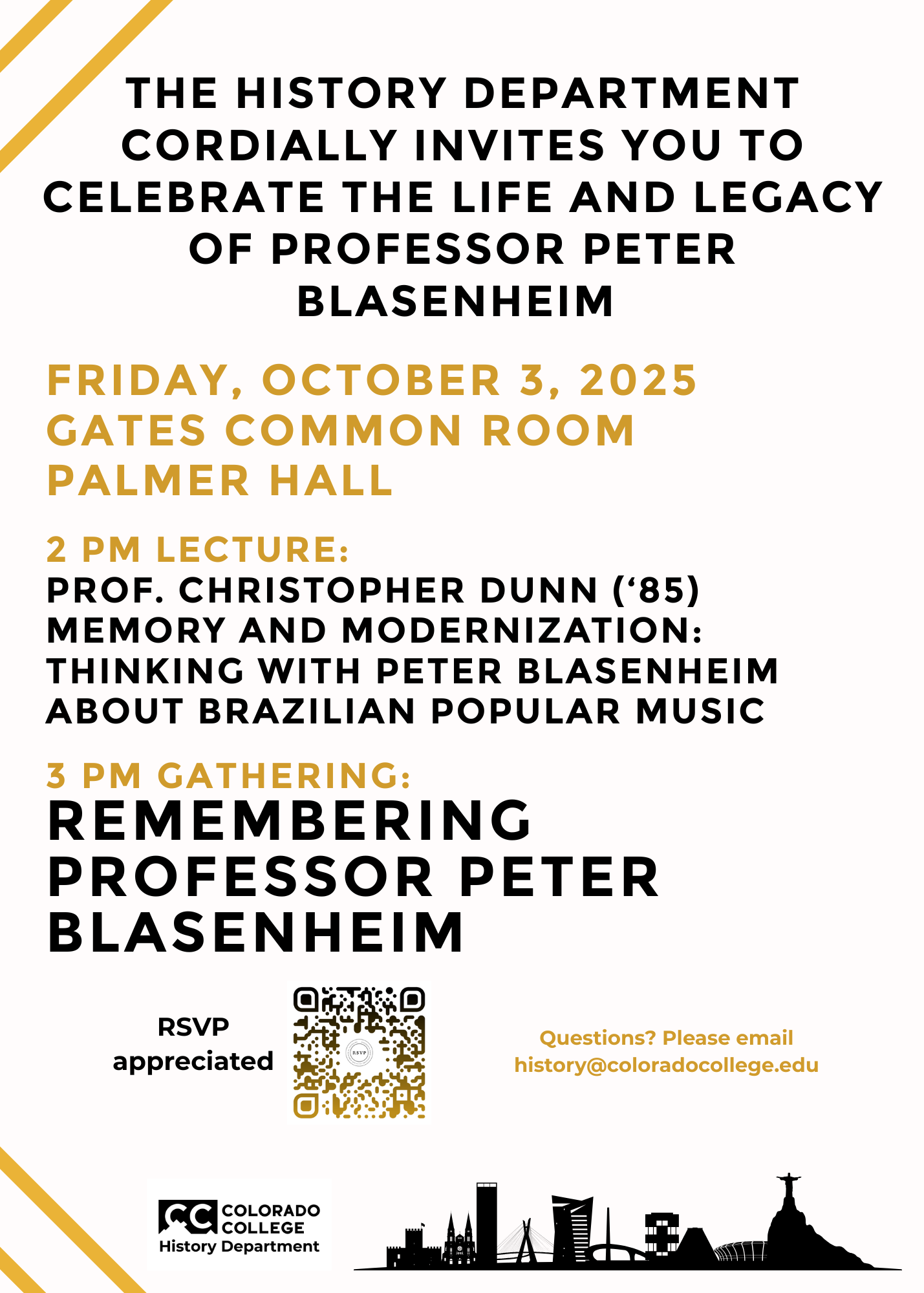
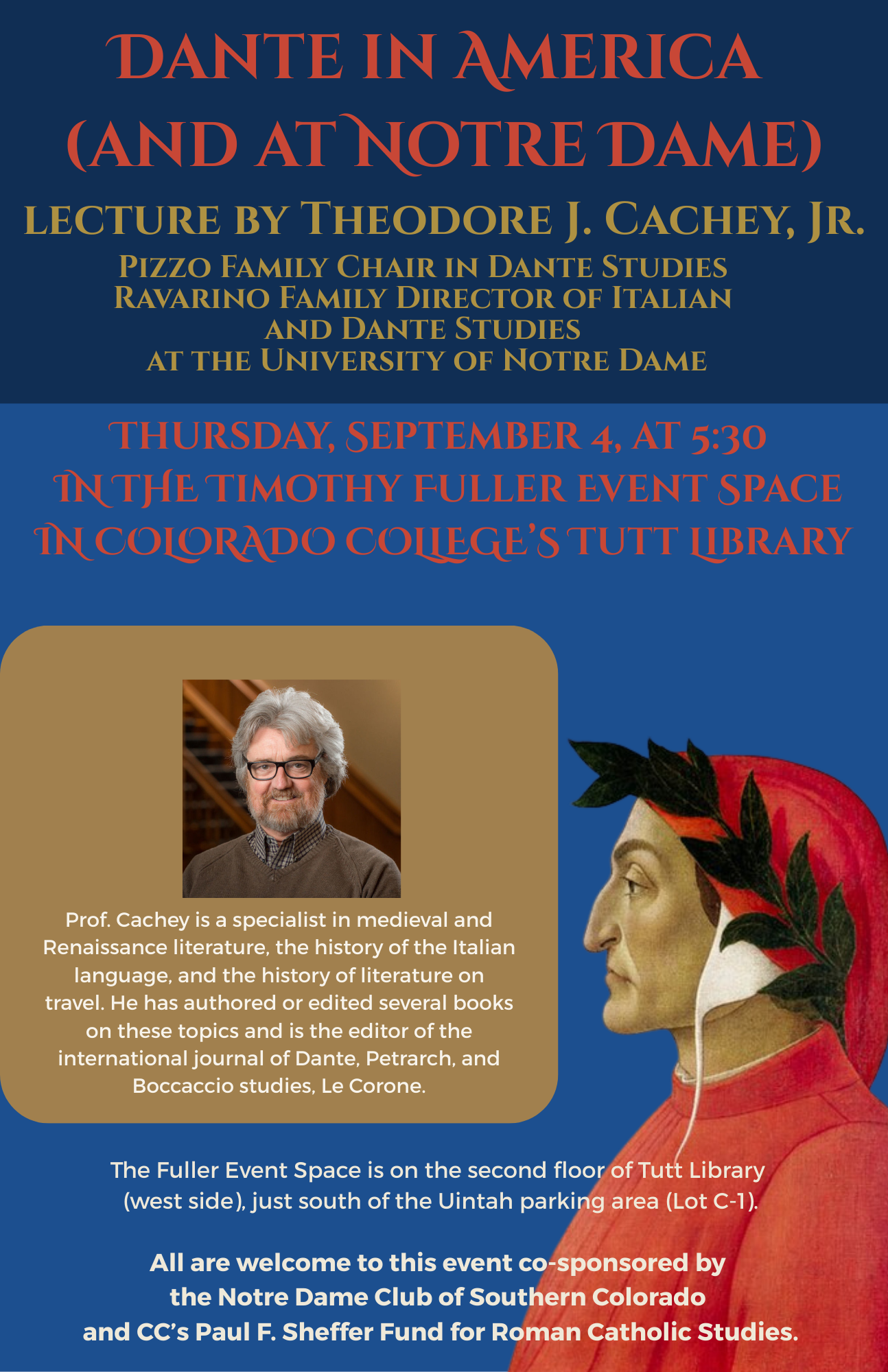
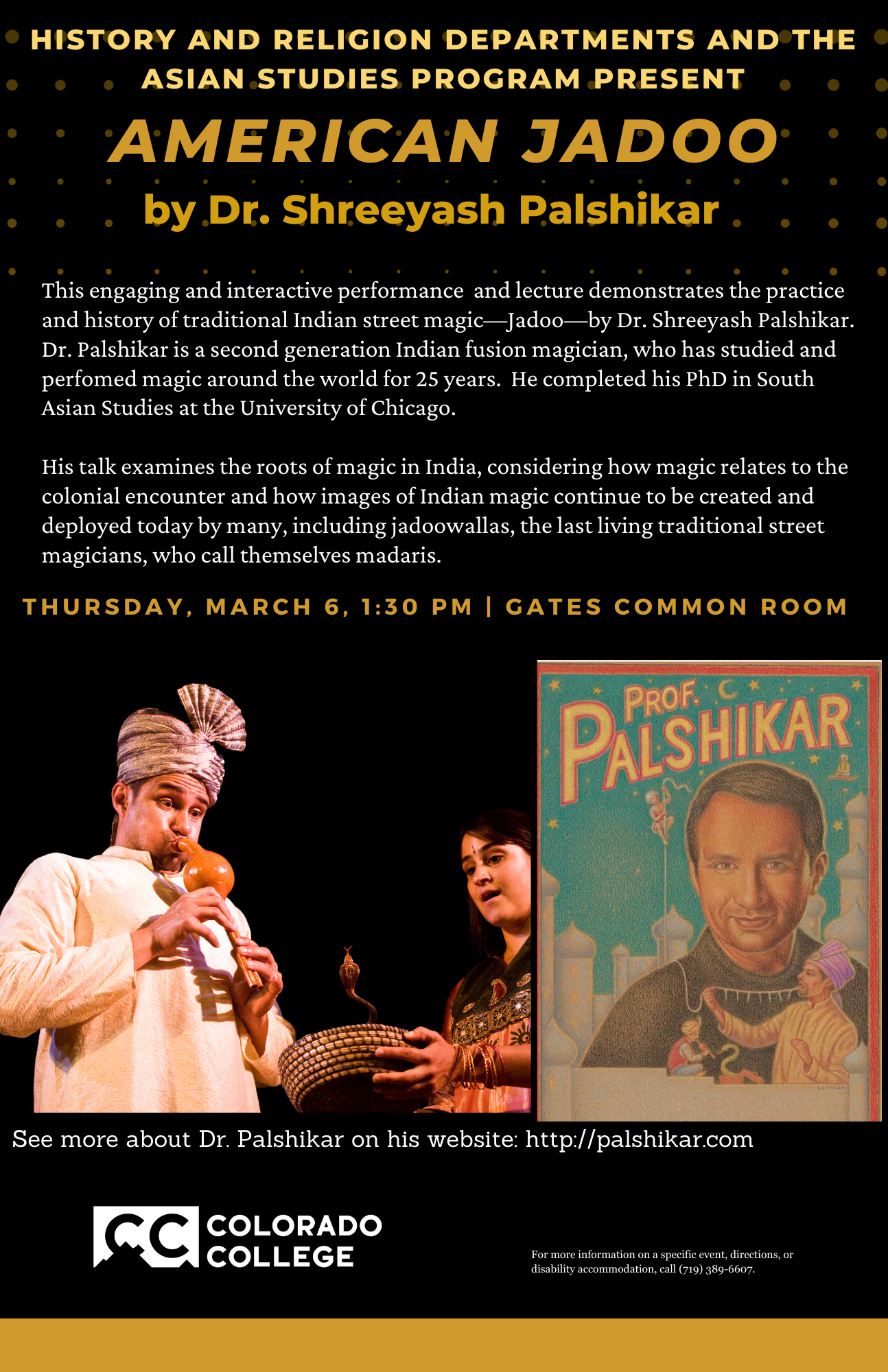 March 6, 1:30PM in Gates Common Room
March 6, 1:30PM in Gates Common Room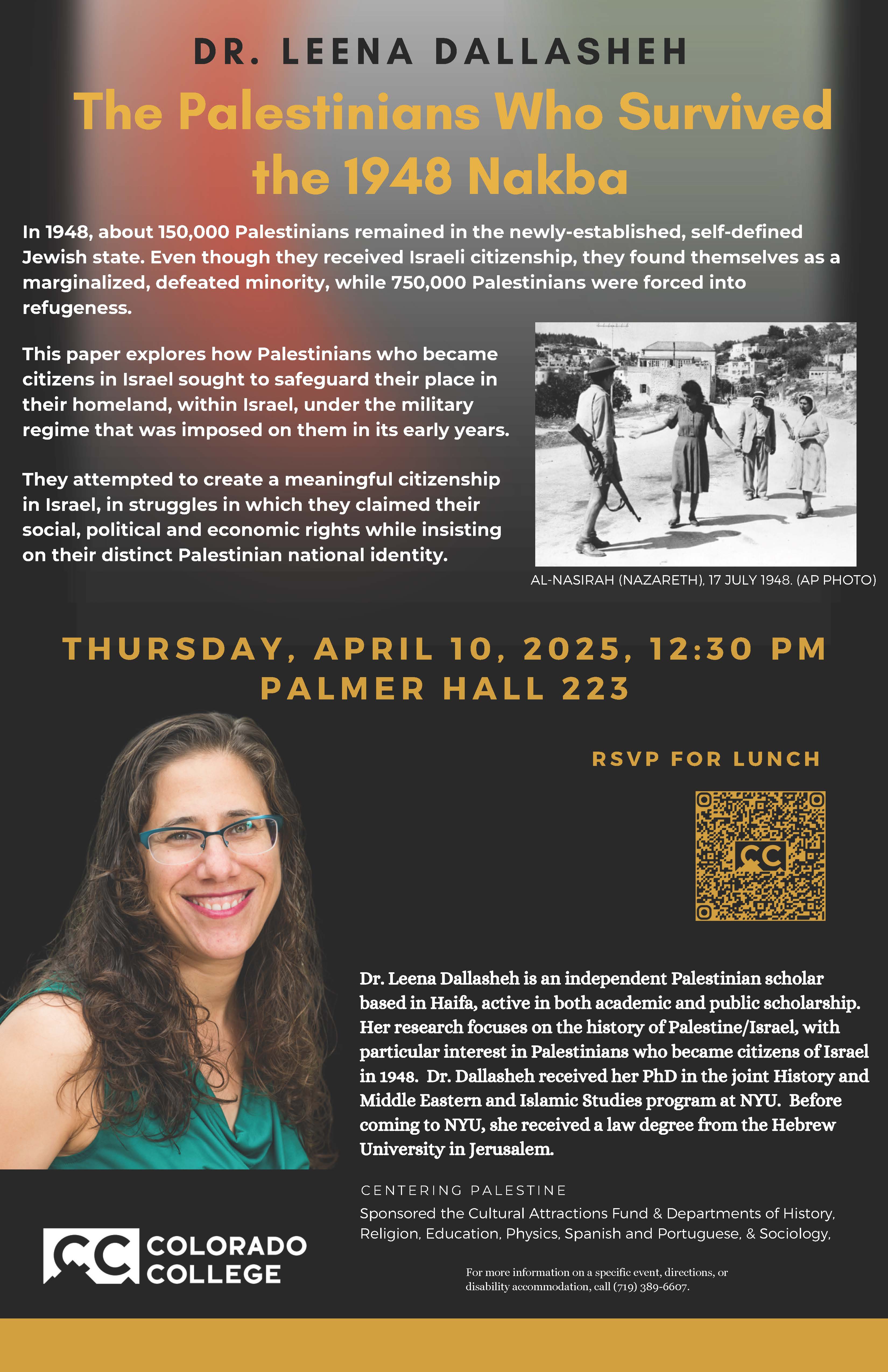 In 1948, about 150,000 Palestinians remained in the newly-established, self-defined Jewish state. Even though they received Israeli citizenship, they found themselves as a marginalized, defeated minority, while 750,000 Palestinians were forced into refugeness.
In 1948, about 150,000 Palestinians remained in the newly-established, self-defined Jewish state. Even though they received Israeli citizenship, they found themselves as a marginalized, defeated minority, while 750,000 Palestinians were forced into refugeness.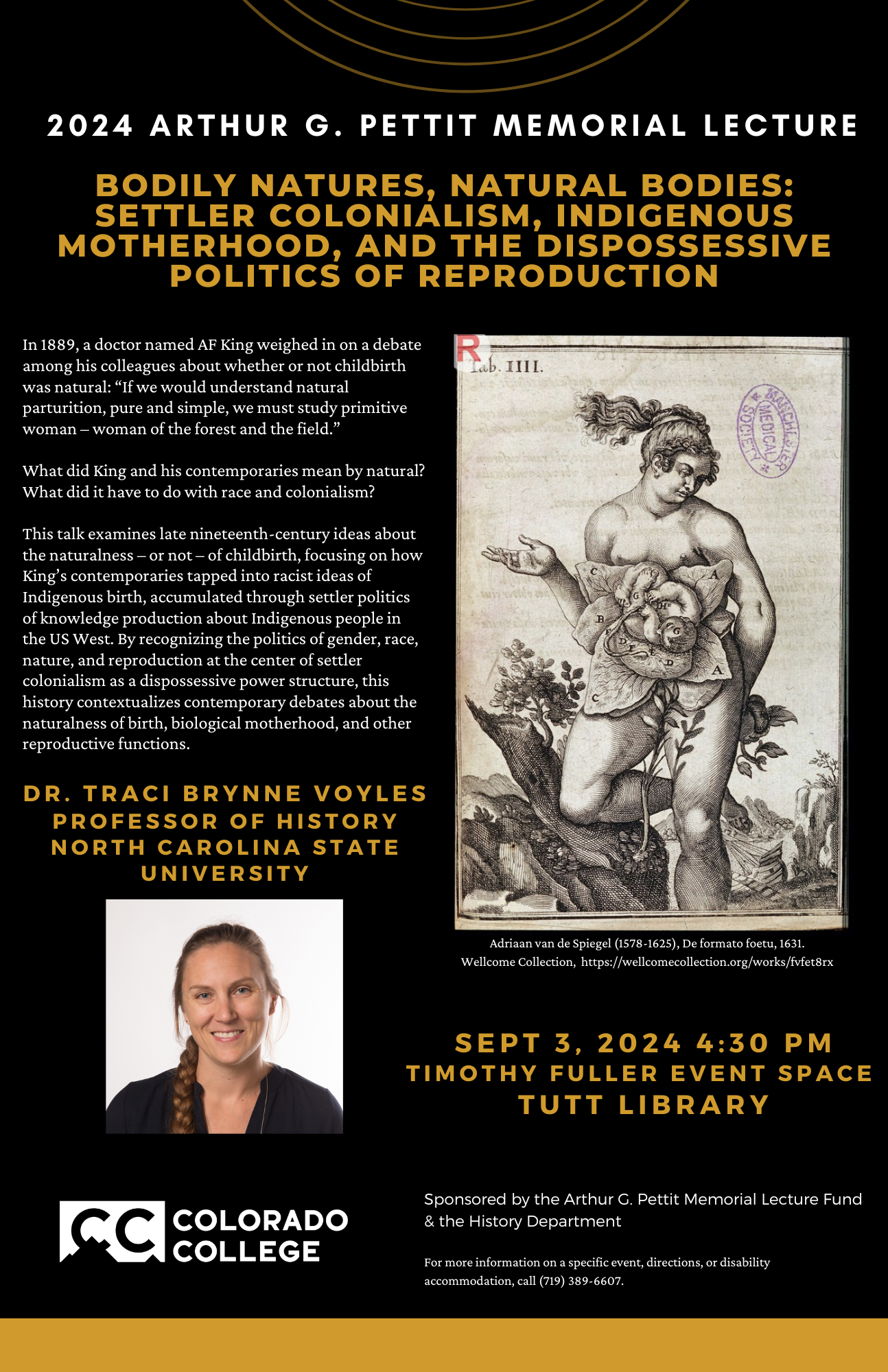
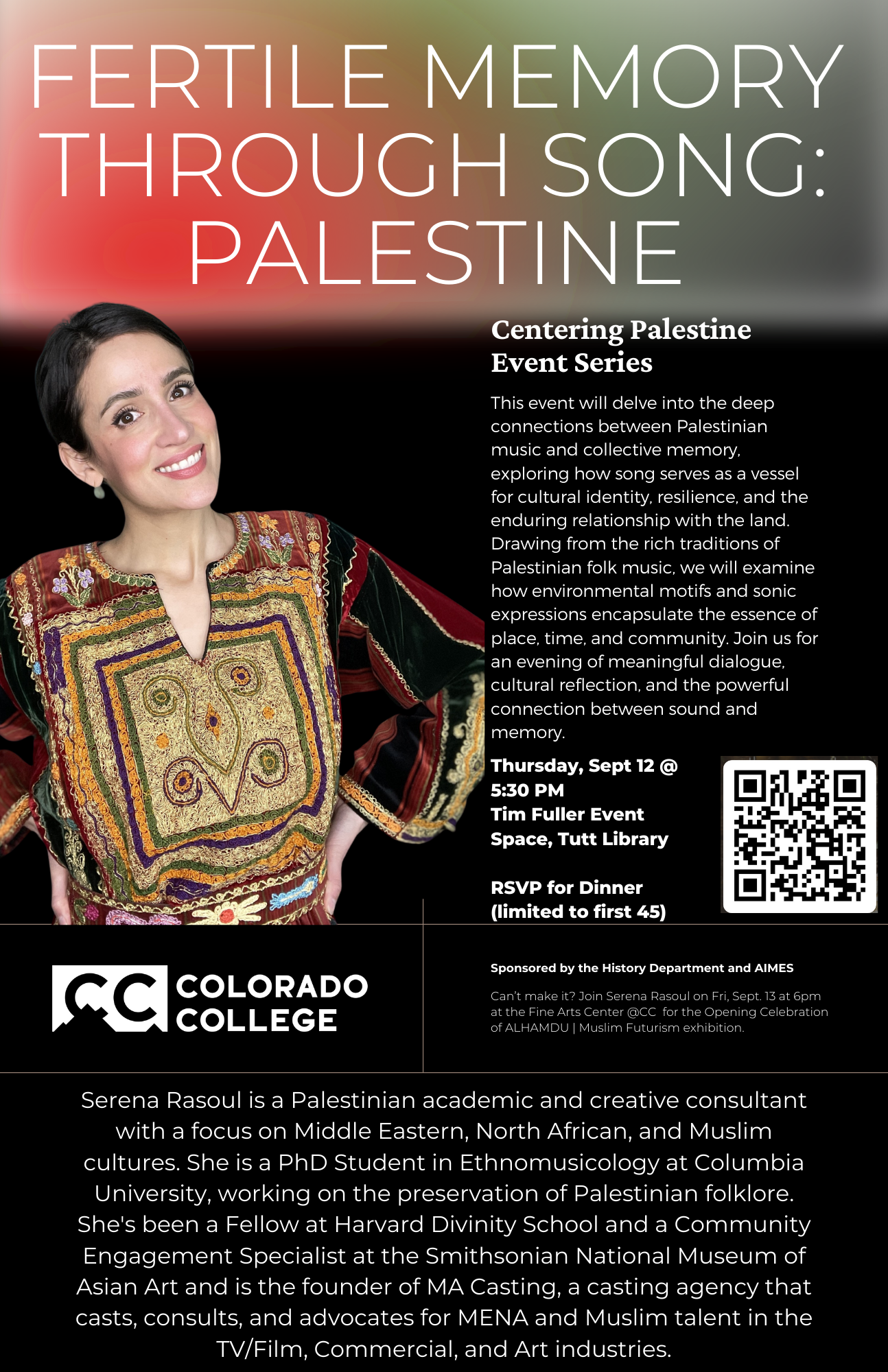
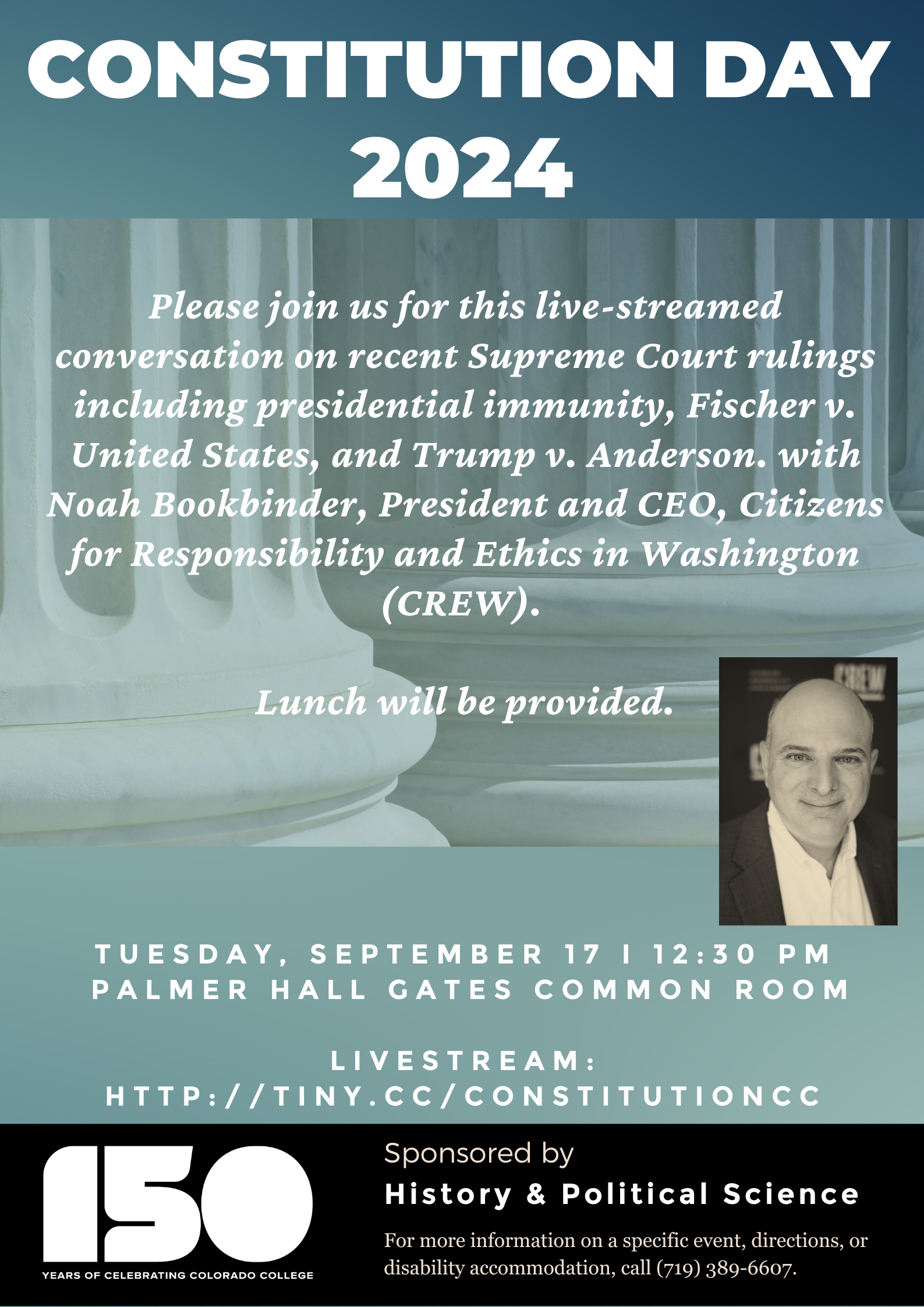
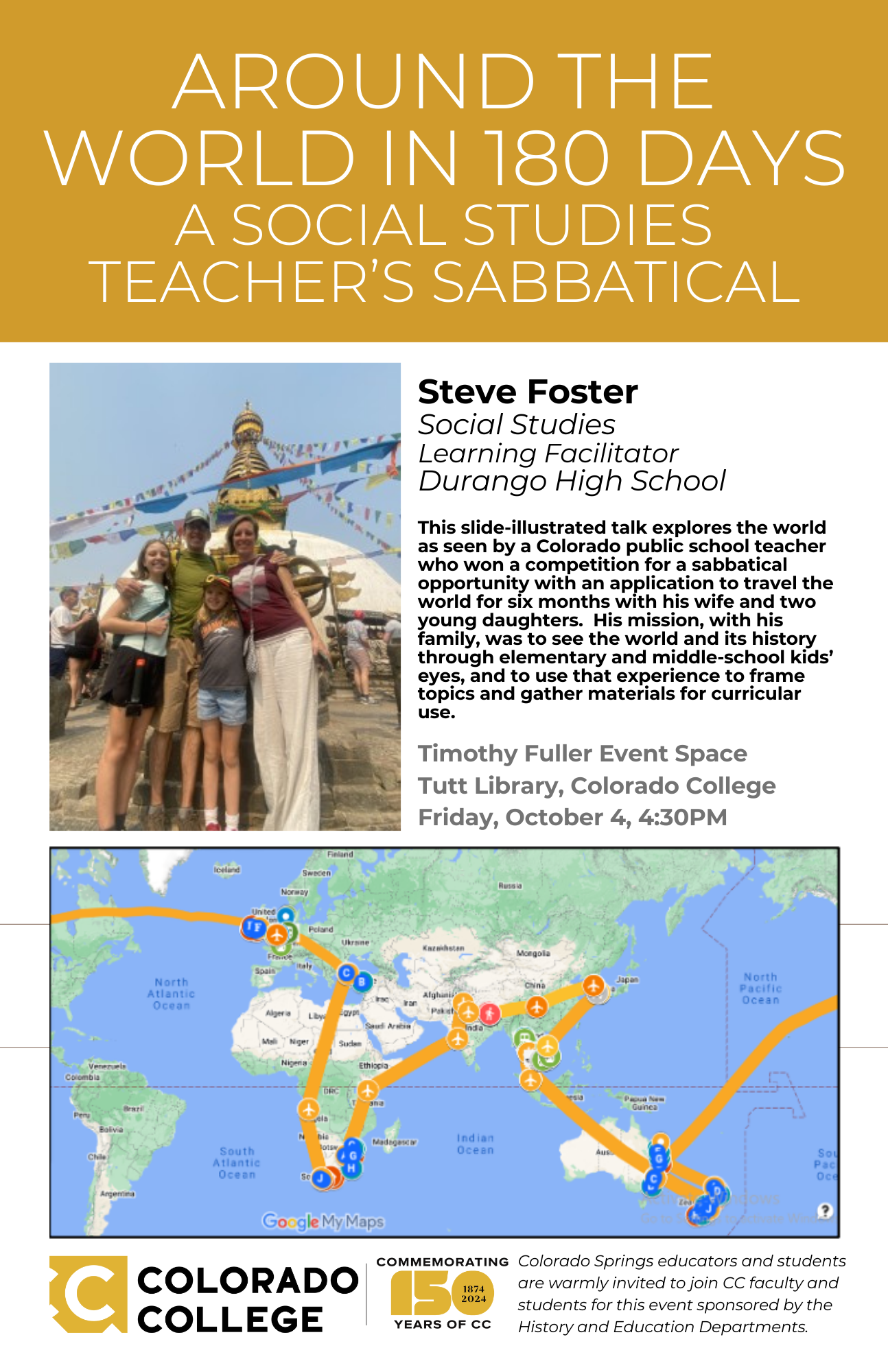 This slide-illustrated talk explores the world as seen by a Colorado public school teacher who won a competition for a sabbatical opportunity with an application to travel the world for six months with his wife and two young daughters. His mission, with his family, was to see the world and its history through elementary and middle-school kids’ eyes, and to use that experience to frame topics and gather materials for curricular use.
This slide-illustrated talk explores the world as seen by a Colorado public school teacher who won a competition for a sabbatical opportunity with an application to travel the world for six months with his wife and two young daughters. His mission, with his family, was to see the world and its history through elementary and middle-school kids’ eyes, and to use that experience to frame topics and gather materials for curricular use.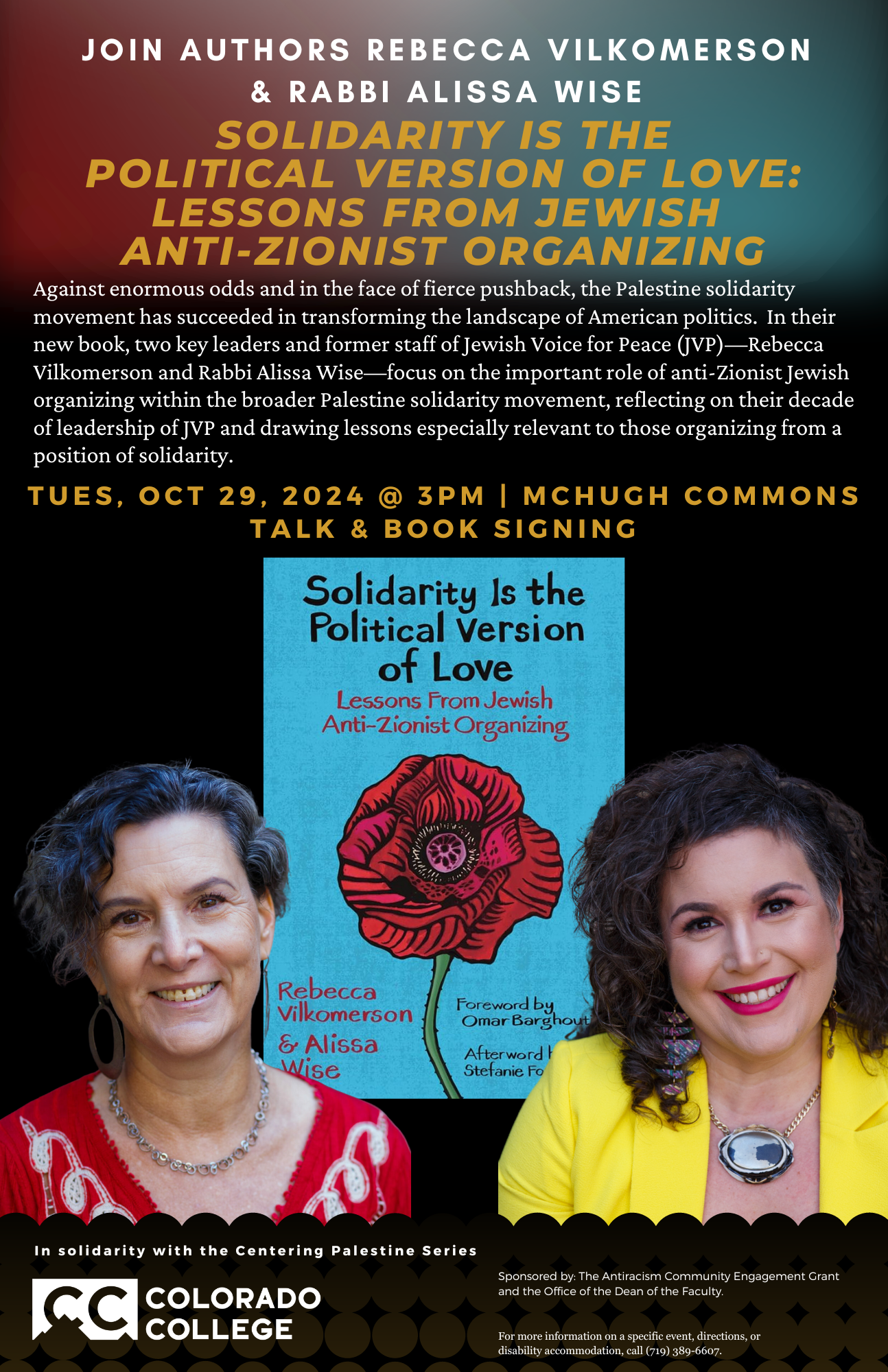
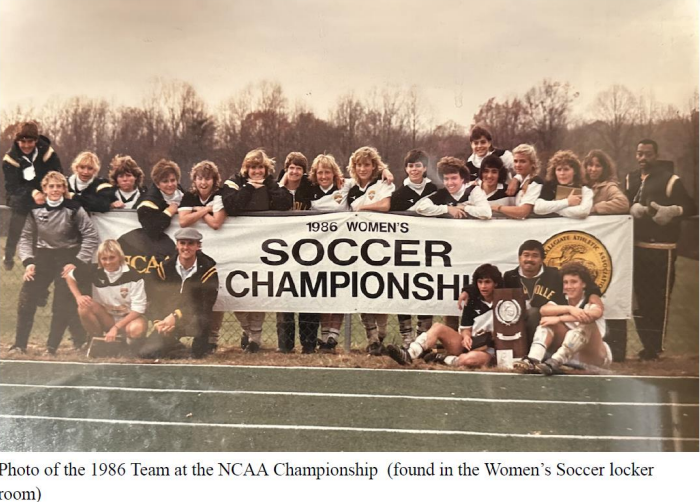
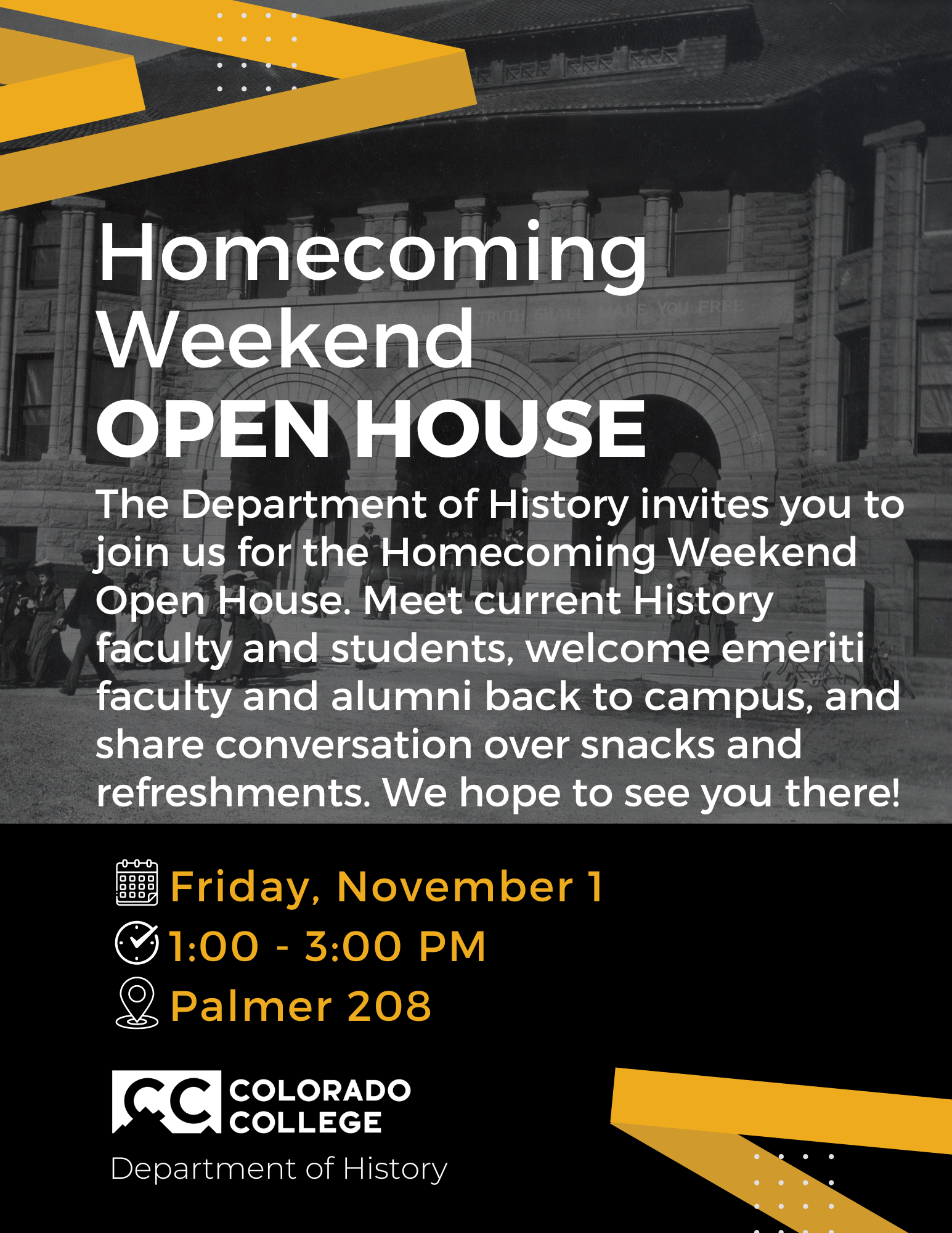
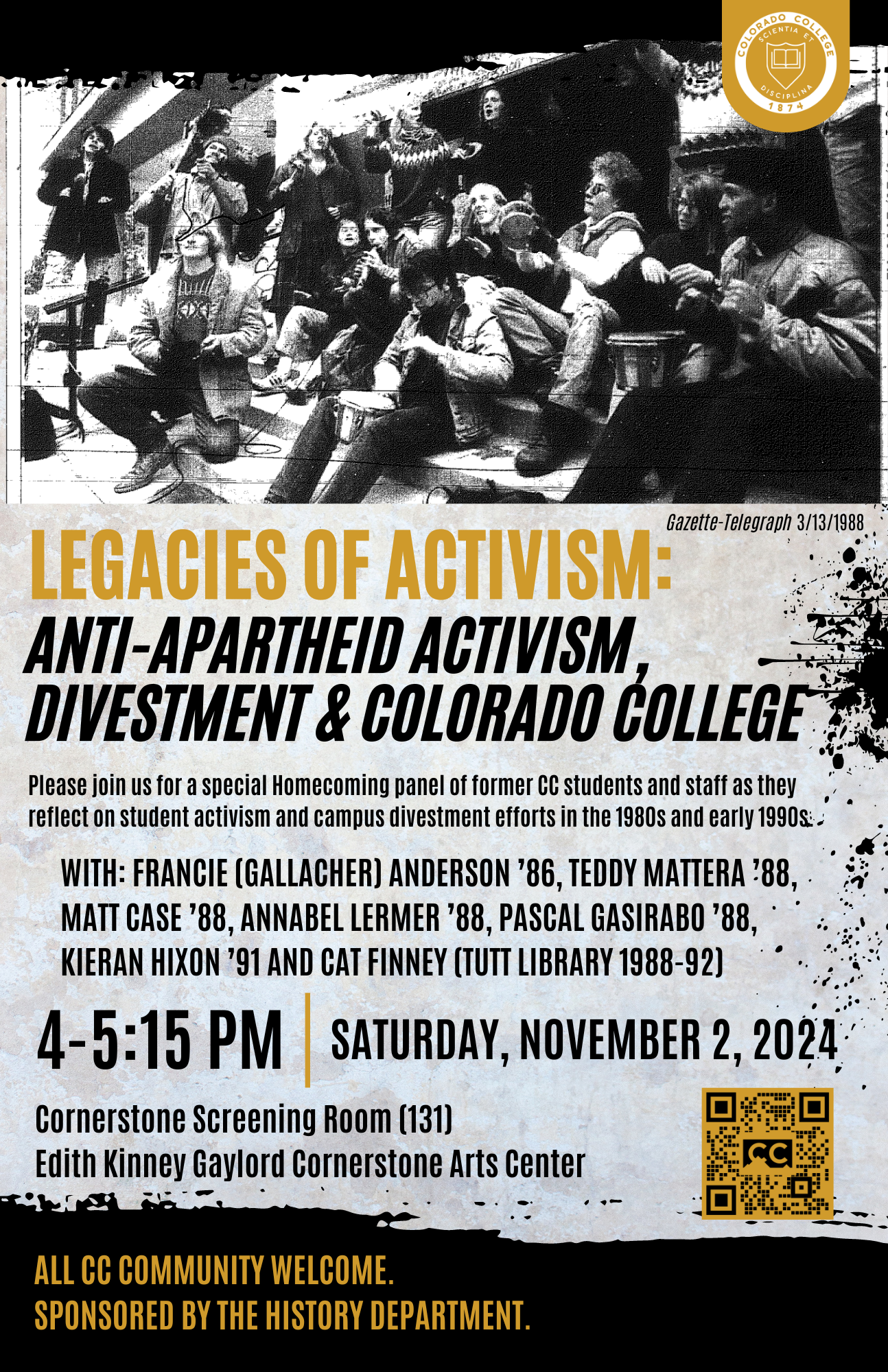 Join: Francie (Gallacher) Anderson ’86, Teddy Mattera ’88, Matt Case ’88, Annabel Lermer ’88, Pascal Gasirabo ’88,
Join: Francie (Gallacher) Anderson ’86, Teddy Mattera ’88, Matt Case ’88, Annabel Lermer ’88, Pascal Gasirabo ’88, 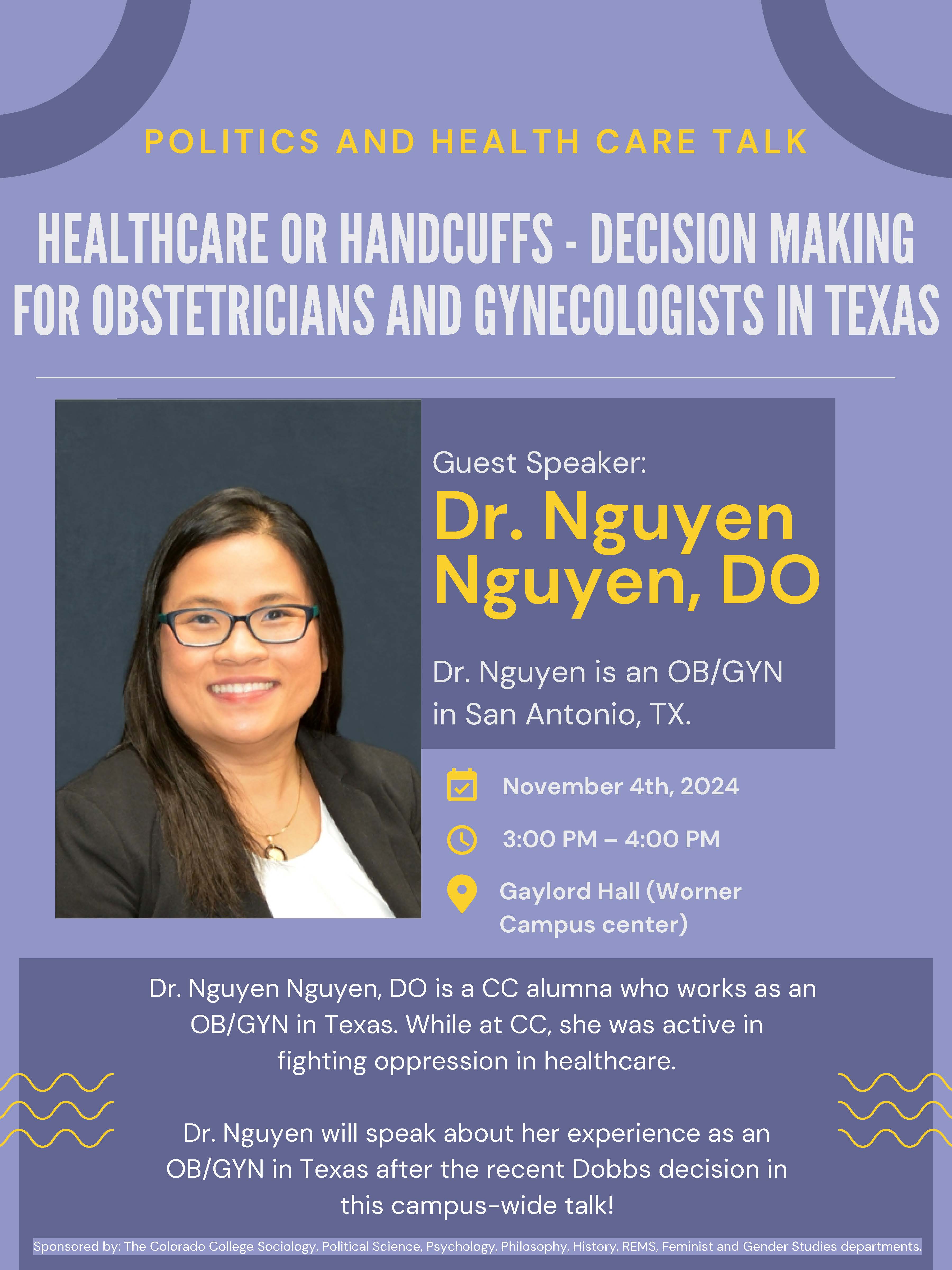 Since the 2022 Supreme Court Dobbs decision, elective terminations became illegal in Texas. Texas has 10% of all the reproductive age women in the US. Over these past two years, Texas abortion clinics have closed and certain towns have even tried to ban out-of-state travel to obtain a termination. Many women have come forward to share harrowing stories about delayed or even denied medical care because of confusion over Texas abortion-related laws. Before Dobbs, there were 4,000 voluntary terminations every month; there are now five or fewer. How are obstetricians and gynecologists on the ground handling this situation? Come hear an expert speak about the state of abortion-related care in Texas.
Since the 2022 Supreme Court Dobbs decision, elective terminations became illegal in Texas. Texas has 10% of all the reproductive age women in the US. Over these past two years, Texas abortion clinics have closed and certain towns have even tried to ban out-of-state travel to obtain a termination. Many women have come forward to share harrowing stories about delayed or even denied medical care because of confusion over Texas abortion-related laws. Before Dobbs, there were 4,000 voluntary terminations every month; there are now five or fewer. How are obstetricians and gynecologists on the ground handling this situation? Come hear an expert speak about the state of abortion-related care in Texas.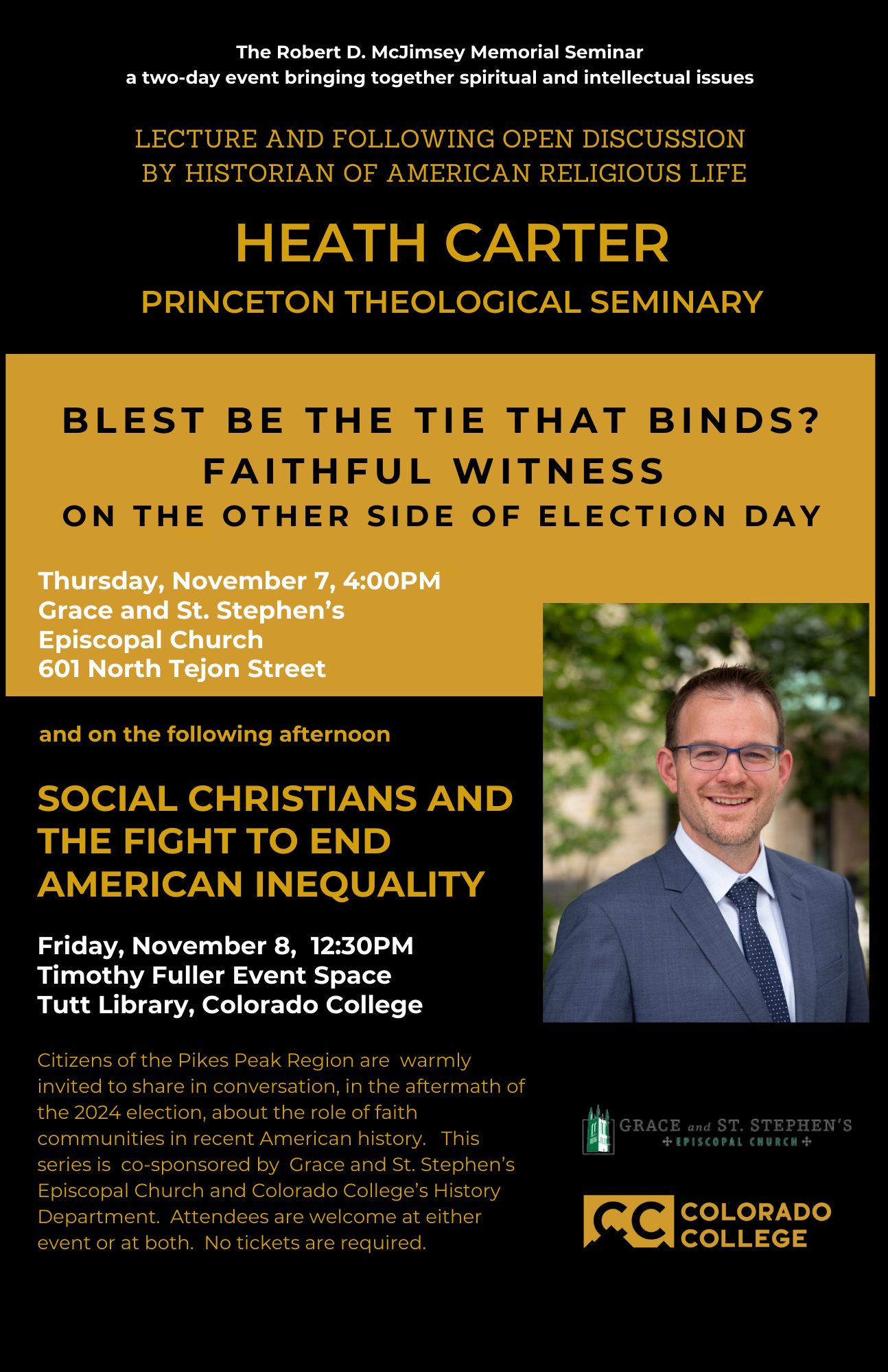
 What if we could design a coin for a future where nations, regions, or communities reclaim their autonomy—or invent new ways to represent themselves? In this hands-on workshop, participants will explore the power of national imagery and collective identity through the lens of speculative imagination. Using collage techniques, we’ll cut, layer, and compose visuals for hypothetical coins that reflect the values, symbols, and aspirations of a people, place, or imagined community. Together, we’ll question: Who would use this currency? What stories should it tell? And how can we create designs that embody representation and pride for a shared future?
What if we could design a coin for a future where nations, regions, or communities reclaim their autonomy—or invent new ways to represent themselves? In this hands-on workshop, participants will explore the power of national imagery and collective identity through the lens of speculative imagination. Using collage techniques, we’ll cut, layer, and compose visuals for hypothetical coins that reflect the values, symbols, and aspirations of a people, place, or imagined community. Together, we’ll question: Who would use this currency? What stories should it tell? And how can we create designs that embody representation and pride for a shared future?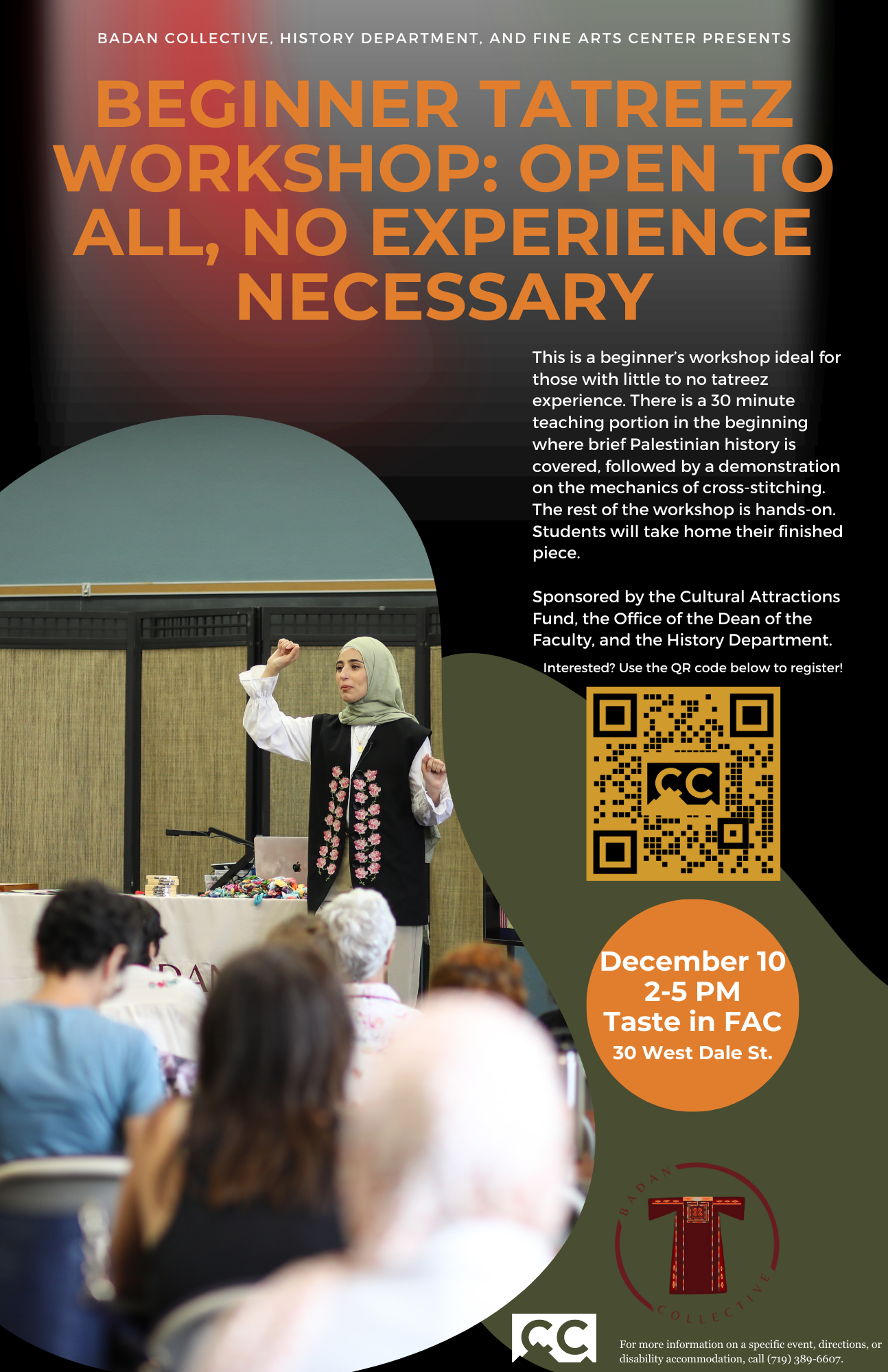 This is a beginner’s workshop ideal for those with little to no tatreez experience. There is a 30 minute teaching portion in the beginning where brief Palestinian history is covered, followed by a demonstration on the mechanics of cross-stitching. The rest of the workshop is hands-on. Students will take home their finished piece.
This is a beginner’s workshop ideal for those with little to no tatreez experience. There is a 30 minute teaching portion in the beginning where brief Palestinian history is covered, followed by a demonstration on the mechanics of cross-stitching. The rest of the workshop is hands-on. Students will take home their finished piece.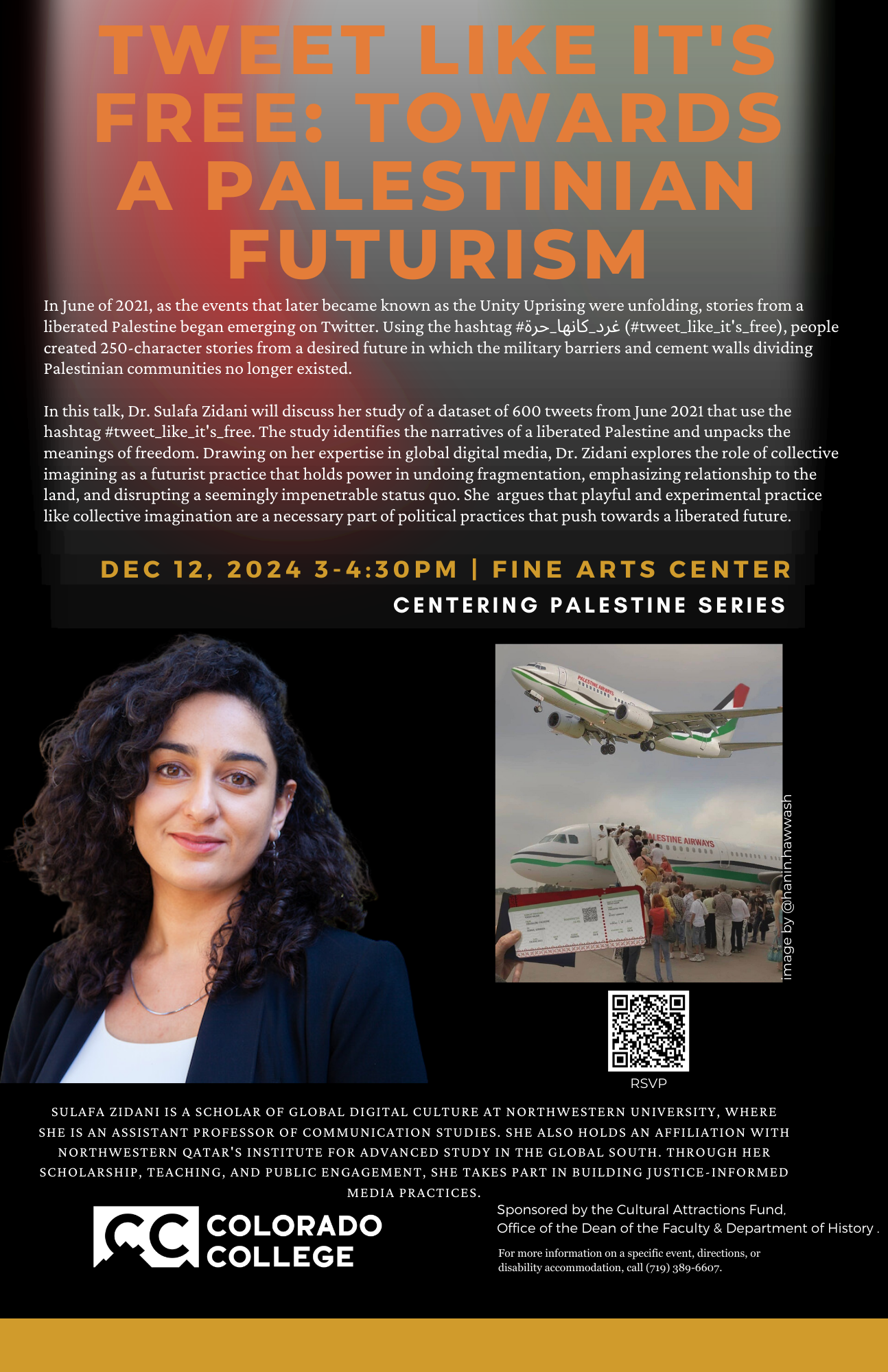 In June of 2021, as the events that later became known as the Unity Uprising were unfolding, stories from a liberated Palestine began emerging on Twitter. Using the hashtag #غرد_كانها_حرة (#tweet_like_it's_free), people created 250-character stories from a desired future in which the military barriers and cement walls dividing Palestinian communities no longer existed. In this talk, Dr. Zidani will discuss her study of a dataset of 600 tweets from June 2021 that use the hashtag #tweet_like_it's_free. The study identifies the narratives of a liberated Palestine and unpacks the meanings of freedom. Drawing on her expertise in global digital media, Dr. Zidani explores the role of collective imagining as a futurist practice that holds power in undoing fragmentation, emphasizing relationship to the land, and disrupting a seemingly impenetrable status quo. She argues that playful and experimental practice like collective imagination are a necessary part of political practices that push towards a liberated future.
In June of 2021, as the events that later became known as the Unity Uprising were unfolding, stories from a liberated Palestine began emerging on Twitter. Using the hashtag #غرد_كانها_حرة (#tweet_like_it's_free), people created 250-character stories from a desired future in which the military barriers and cement walls dividing Palestinian communities no longer existed. In this talk, Dr. Zidani will discuss her study of a dataset of 600 tweets from June 2021 that use the hashtag #tweet_like_it's_free. The study identifies the narratives of a liberated Palestine and unpacks the meanings of freedom. Drawing on her expertise in global digital media, Dr. Zidani explores the role of collective imagining as a futurist practice that holds power in undoing fragmentation, emphasizing relationship to the land, and disrupting a seemingly impenetrable status quo. She argues that playful and experimental practice like collective imagination are a necessary part of political practices that push towards a liberated future. 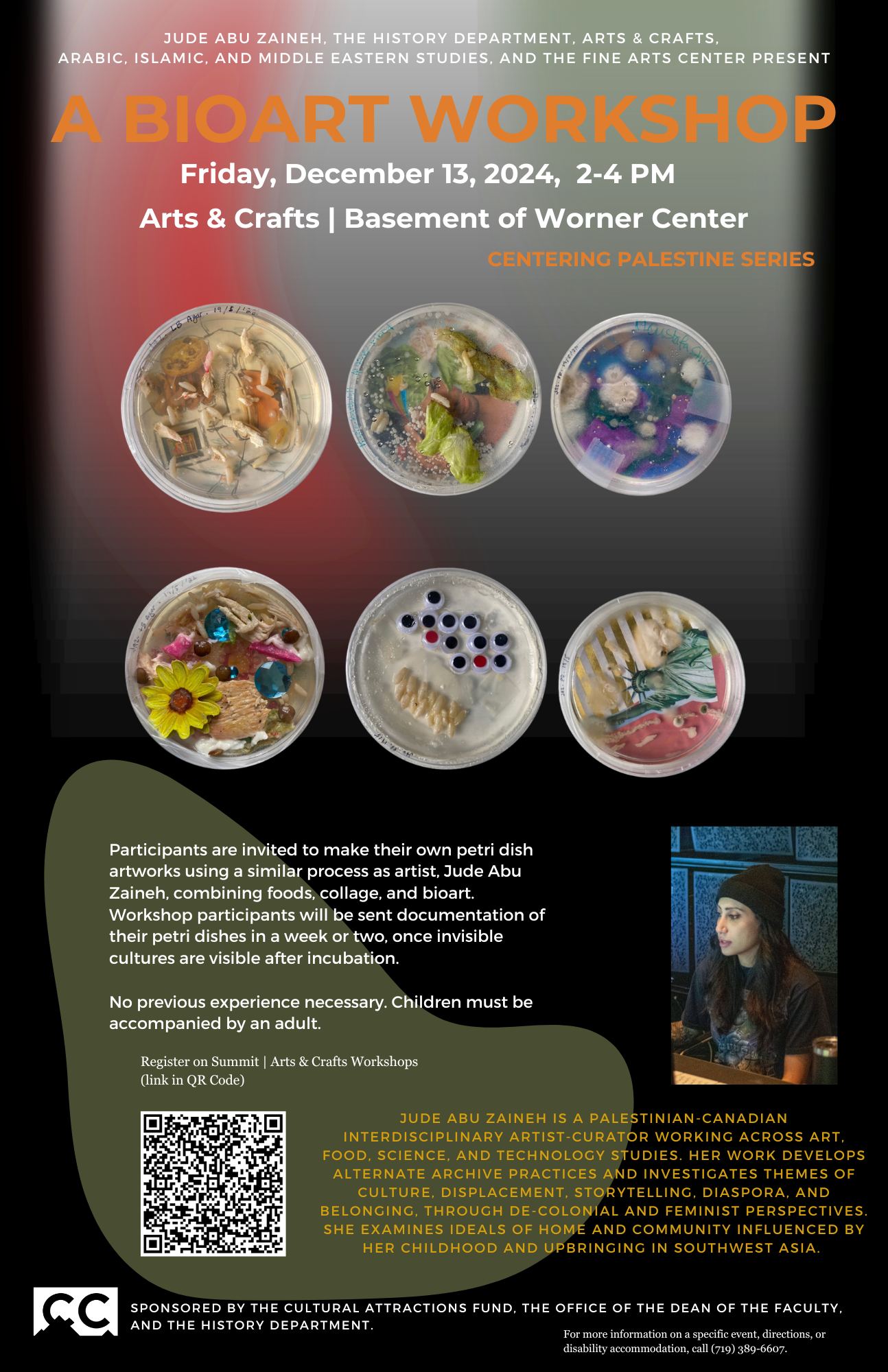 Participants are invited to make their own petri dish artworks using a similar process as artist, Jude Abu Zaineh, combining foods, collage, and bioart. Workshop participants will be sent documentation of their petri dishes in a week or two, once invisible cultures are visible after incubation.
Participants are invited to make their own petri dish artworks using a similar process as artist, Jude Abu Zaineh, combining foods, collage, and bioart. Workshop participants will be sent documentation of their petri dishes in a week or two, once invisible cultures are visible after incubation. Join us for the Kuffiya Kite Club, a workshop where we’ll build kites from simple materials and explore the interplay of wind, chance, and balance as we take to the skies.
Join us for the Kuffiya Kite Club, a workshop where we’ll build kites from simple materials and explore the interplay of wind, chance, and balance as we take to the skies.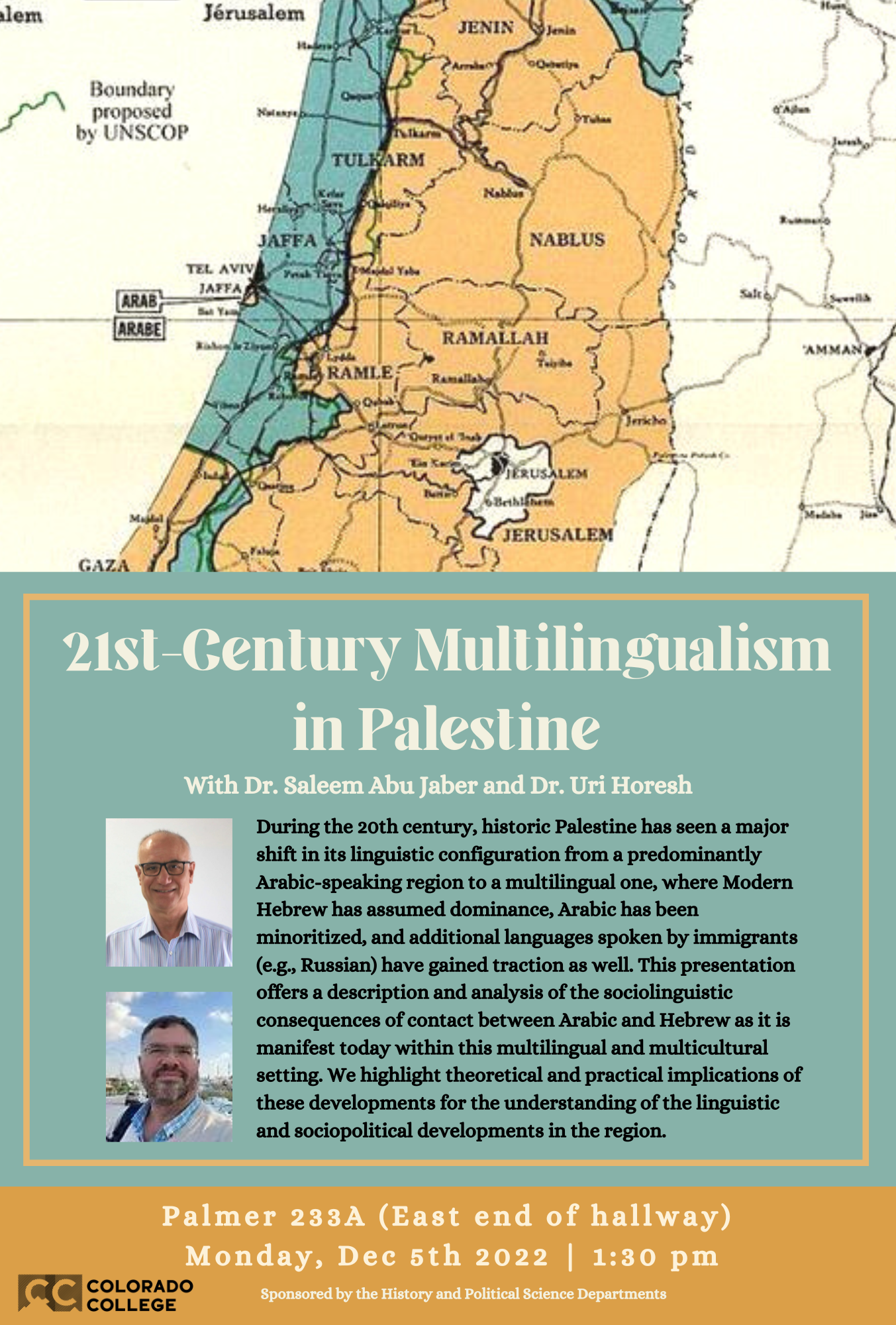
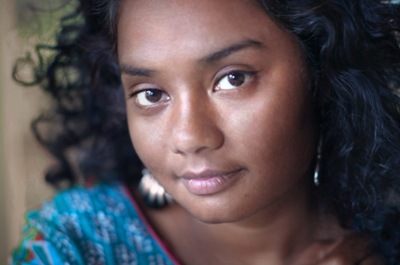
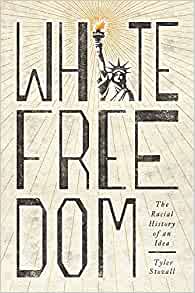 Nation, Black France/France Noire: The History and Politics of Blackness, and Paris Noir: African Americans in the City of Light. This year, he published White Freedom: The Racial History of an Idea. This talk was the inaugural lecture in a lecture series brought to you by European Studies and an interdisciplinary program. Dr. Stovall’s visit to Colorado College was also made possible by support from the History Department, Africana Studies, the President’s Office, the Dean’s Office, and the Hochman Chair in History.
Nation, Black France/France Noire: The History and Politics of Blackness, and Paris Noir: African Americans in the City of Light. This year, he published White Freedom: The Racial History of an Idea. This talk was the inaugural lecture in a lecture series brought to you by European Studies and an interdisciplinary program. Dr. Stovall’s visit to Colorado College was also made possible by support from the History Department, Africana Studies, the President’s Office, the Dean’s Office, and the Hochman Chair in History.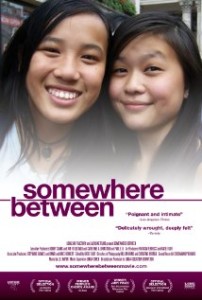 A screening of the documentary film Somewhere Between, a film on Chinese adoptions, with a discussion lead by professors John Williams and Jason Weaver following.
A screening of the documentary film Somewhere Between, a film on Chinese adoptions, with a discussion lead by professors John Williams and Jason Weaver following. 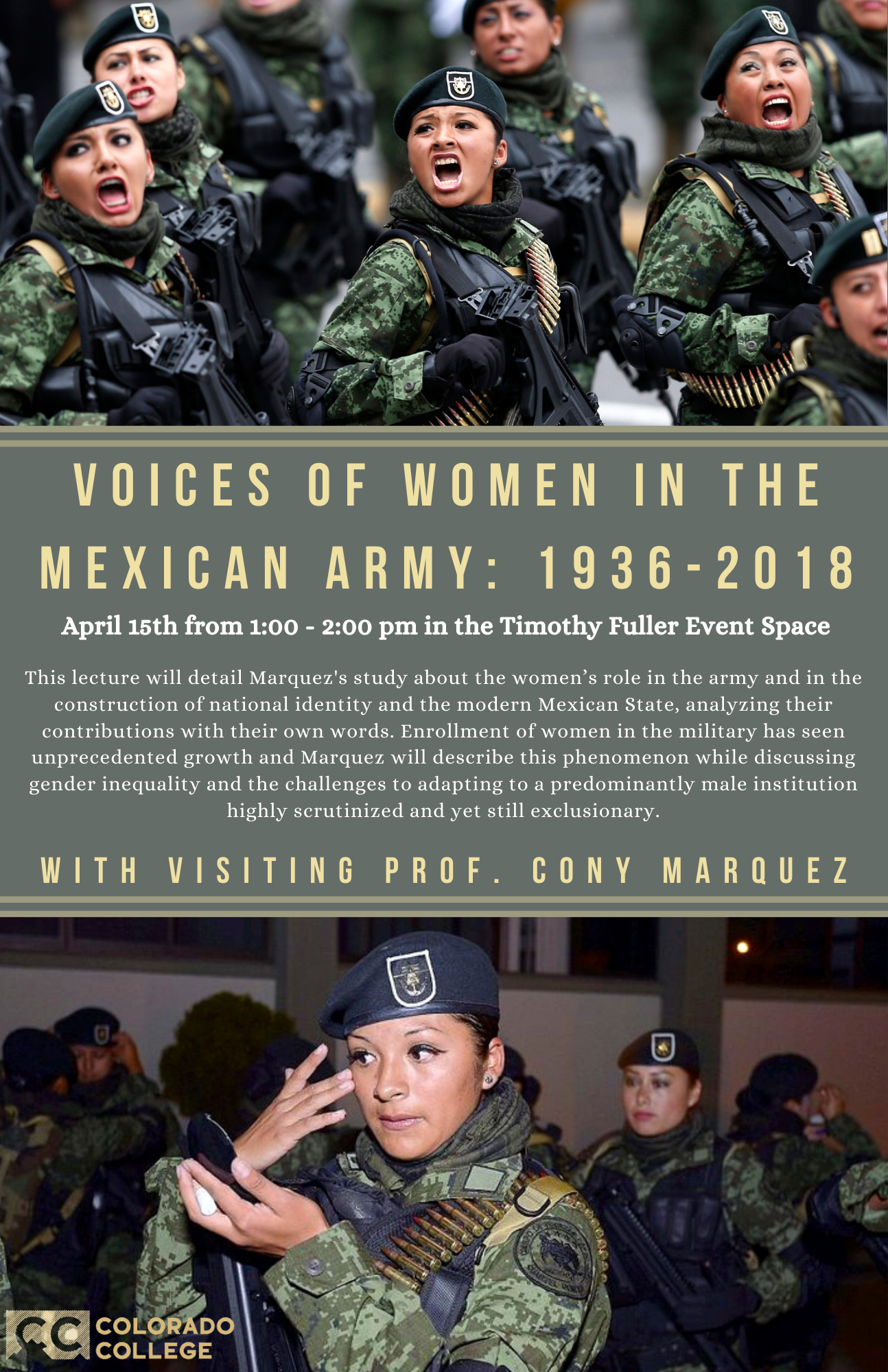 Join us April 15th at 1:00pm in the Timothy Fuller Event Space for a lecture with Cony Marquez - "Voices of Women in the Mexican Army: 1936-2018"
Join us April 15th at 1:00pm in the Timothy Fuller Event Space for a lecture with Cony Marquez - "Voices of Women in the Mexican Army: 1936-2018"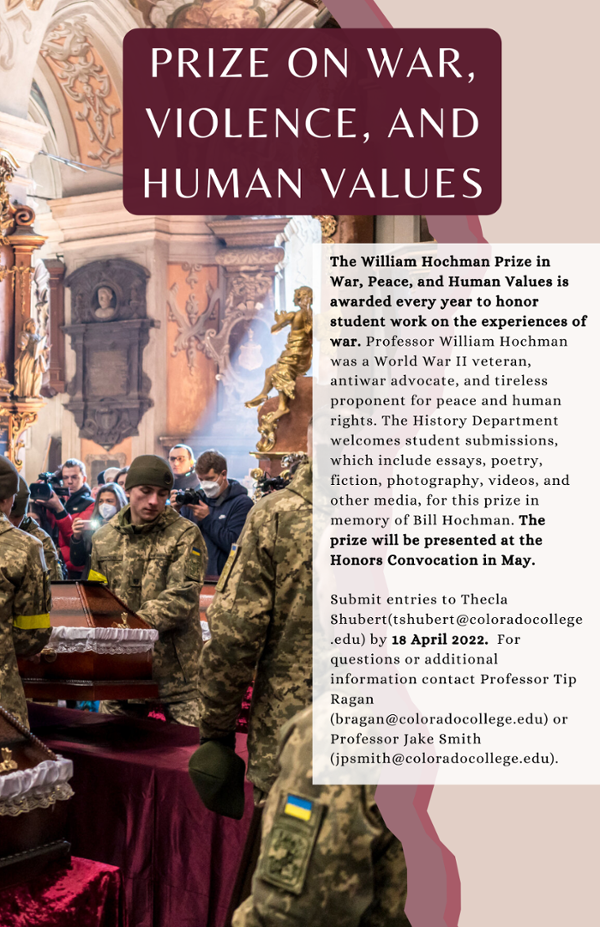 The William Hochman Prize in War, Peace, and Human Values is awarded every year to honor student work on the experiences of war. Professor William Hochman was a World War II veteran, antiwar advocate, and tireless proponent for peace and human rights. The History Department welcomes student submissions, which include essays, poetry, photography, videos, and other media, for this prize in memory of Bill Hochman. Please send materials to Thecla Shubert (
The William Hochman Prize in War, Peace, and Human Values is awarded every year to honor student work on the experiences of war. Professor William Hochman was a World War II veteran, antiwar advocate, and tireless proponent for peace and human rights. The History Department welcomes student submissions, which include essays, poetry, photography, videos, and other media, for this prize in memory of Bill Hochman. Please send materials to Thecla Shubert (